5 Volumes
Constitutional Era
American history between the Revolution and the approach of the Civil War, was dominated by the Constitutional Convention in Philadelphia in 1787. Background rumbling was from the French Revolution. The War of 1812 was merely an embarrassment.
Philadephia: America's Capital, 1774-1800
The Continental Congress met in Philadelphia from 1774 to 1788. Next, the new republic had its capital here from 1790 to 1800. Thoroughly Quaker Philadelphia was in the center of the founding twenty-five years when, and where, the enduring political institutions of America emerged.
History: Philadelphia and the Quaker Colonies
Philadelphia and the Quaker Colonies
Four Constitutions
Multi-national unions of republics are uncommon, usually brief and seldom voluntary. America has had three of them, but we only got it right the second time. Uncertain why we succeeded when many others failed, we remain skeptical of changing the rules. The Europeans, on the other hand, are uncertain whether they want to follow the Confederate States of America toward extinction, or the United States of America toward world domination. When deeply considered, it is a hard choice.
Constitutionalism: American Mixtures of A Republic and a Democracy
New volume 2017-03-12 19:22:27 description
..The Constitution
Our Constitution was not a proclamation written by a convention. It was a negotiated contract for uniting thirteen sovereign independent states. Nothing like that had ever been done voluntarily, and few nations have matched it in two hundred years, even with the use of force.
 We the People of the United States, in Order to form a more perfect Union, establish Justice, insure domestic Tranquility, provide for the common defence, promote the general Welfare, and secure the Blessings of Liberty to ourselves and our Posterity, do ordain and establish this Constitution for the United States of America. 
|
| Preamble, by Gouverneur Morris |
NATIONAL constitutions are an outgrowth of the 18th Century Enlightenment, even though some similar features are found in ancient legal codes. Those who trace the American constitution to the 13th Century Magna Carta usually attach it to a central sentence of its clause 39:
No free man shall be arrested, or imprisoned, or deprived of his property, or outlawed, or exiled, or in any way destroyed, nor shall we go against him or send against him, unless by legal judgement of his peers, or by the law of the land.
The Magna Carta proclaims that government may not use force against a citizen unless the nation had collectively embraced the principle which was being invoked. That's surely a sound legal doctrine, but it's unrecognizeable as a Constitution. For that, it lacks structure and specifics for actually going ahead with it. Viewed in that light, the Magna Carta resembles the Iliad and Odyssey, which illustrate many of the behaviors which the Greeks thought were worthy, but does not connect them to an organized structure of governance. Many philosophers of government during the Enlightenment period also neglected to confront where their ideas might be taking them. Indeed, the American Constitution was even the first Constitution to be written out, which struck others as a novel idea. Seldom among the writings of Montesquieu (The Spirit of the Laws, 1748), Catherine the Great (Nakaz, Instructions to the All-Russian Legislative Commission, 1767), Diderot (Observations About Nakaz, 1774), can there be found a contract for government design or its main contingencies. Certainly there is no such specificity within the writings of Adam Smith, if we look for rule-making among Enlightenment thinkers whose ideas strongly influenced the 1787 Philadelphia document. The American Constitution was the product of many minds, before and after 1787, chiefly James Madison's. Its nearly final form emerged from the Constitutional Convention of the summer of 1787, held in Philadelphia with Gouverneur Morris as penman, or editor. To him we owe its pleasing succinctness, which is a main source of national affection for the document. That may have been artful; in his diary of the secret meetings, James Madison records that Gouverneur Morris rose to speak about 170 times, more than any other delegate. Lots of thought and debate; ultimately, few words.
The Elizabethan Sir Francis Bacon is thought to have the greatest claim on devising a theory of communal law-making in the Anglican tradition, now called the Common Law. His elegant modification of Galileo's 16th Century creation of the scientific method originated mostly as a proposed methodology for devising good laws, which over time the entire legal profession then evolved into England's preferred legal principles. However, tracing the American Constitution back to an underlying British one stumbles when the evolved British Constitution fails to meet a definition which would include America's constitution, which has become the premier model. The British Constitution is said to be "unwritten" to the degree it is a consensus of revered documents, defining its culture, not its government. It can be amended by Parliament at will, has a turbulent history of specifying just who is covered by it, and in order to define constitutional principles seems to rely on sentences extracted from difficult context. If the two constitutions had been written and compared at the same time, one would say the British had sacrificed cohesiveness out of respect for tradition. In fairness, some features of the American constitution are also unnecessary for every constitution, but by surviving as part of the oldest constitution in the modern form, have now become part of the model. The essence would be:
A set of principles establishing the legitimacy of a nation's laws, remaining firmly above them within the modified Republic it describes. It defines its domain by defining the voting requirements of its citizenry, loosely deriving geographical sovereignty by treaty with its neighbors. It supersedes all other governance within its domain. It respects its own origins but when it conflicts, locates sovereignty in the will of its citizens. It includes a description of how to amend it, which is intentionally difficult. It goes on to outline the overall structure of the laws it regulates, with subtle modifications to channel the type of structure which will result. The rights of life, liberty and property were axiomatic, with property left unspoken within the pursuit of happiness.
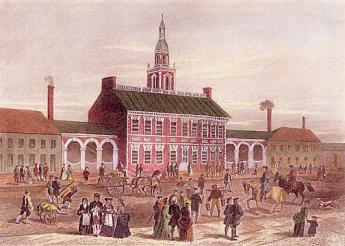
|
| Independence Hall |
In the American view, history contained a few extra temptations of all governments, so troublesome their restraint justified the extra difficulty of amendment at the Constitutional level. To lessen controversy, these Rights might be regarded as coming from God, but they are vaguely described here as innate in the human condition. The overall government design was to be: a bicameral republican legislature, with separated executive and judicial branches. But that was only a federal superstructure, confined to a few enumerated national powers essential to maintaining Union; state governments retain all other unenumerated powers, and when unaddressed by the states were retained by the people. Incomplete but prominent operational features would be:
Separation and re-balancing government powers among the national government branches and/or federated states, reducing the power of governmental departments to dominate each other, and thus enhancing citizen liberty from all parts of dominating government by enhancing citizen power to shift allegiance between federal branches, and between states and federal. Powers were not only separated, but when possible given the means to maintain and defend their independence from each other. Even domination by large or populous states was restrained. Church and State were proclaimed forever separate, for like purpose. A right was given to citizens to bear arms, perhaps strengthening citizens' defense against external attack but primarily to reduce government's monopoly of military power in the event of citizen rebellion against government dominion. And perhaps to warn that revolt was possible, even endorsed, as some final extremity in defense of liberty. Widespread wariness about government abuses of power stems from the fact that most American citizens in 1787, had until recently been revolutionaries themselves and sympathized with that stance.
It probably enhances our understanding to mention the contrasting outcome of competitive 18th Century implementations of the Constitution idea. Russia's Catherine the Great proposed a constitution steeped in the traditions of the Enlightenment, but ultimately designed to define and strengthen the role of the monarch. Denis Diderot her French protege recoiled, substituting other views of citizen power resembling those of Jean Jacob Rousseau. Diderot opened Observations About Nakaz his commentary to the Queen, with the following declaration:
There is no true sovereign except the nation; there can be no true legislator except the people.
With this ringing warcry, the extremist French model ushered in the opposite outrages of the Terror, the Guillotine, and the Napoleonic conquests. The French constitution and its consequences undermined world confidence in the universal benevolence of public opinion, deeply confounding those for whom democratic rule was paramount. Observing this, a certain amount of new life was breathed into allegiance for monarchy, military rule, and dictatorship. If mankind were innately good, how could national opinion so promptly overturn other standards of decency? Public opinion was apparently neither invariably benign, nor necessarily far-seeing. The "noble savage", human nature naked of the taint of civilization, was not invariably wise or worthy of trust. Edward Gibbon, the 1776 author of The Decline and Fall of the Roman Empire was perhaps pointing out, to believers in the collective goodness of the human condition, where mistakes might lead. At the least, the failure of the French Revolution strengthened the reputation of Scottish philosopher Adam Smith, who in 1776 had urged national reliance on a sense of collective self-interest, as follows:
It is not from the benevolence of the butcher, the brewer, or the baker, that we can expect our dinner, but from their regard to their own interest.
Diderot rejected Catherine's view of things, although in view of his dependence on her, it is unsurprising he would withold publishing his rejection of it until 1823. Thomas Jefferson was in France as ambassador at the time of the Constitutional Convention, and fearing to confront George Washington, also kept his conflicting views private for several years. Eventually they surfaced in the creation of an anti-Federalist political party and in the roiling conflicts of the next forty years, which offer abundant reasons for American and Madisonian humility about anyone's constitutional skills. It is however a testimony to the strength of the Constitutional Convention's design that the country was then able to waver between two extreme governing philosophies without requiring a change in the Constitution. Indeed, it is plausible to contend that our political parties continue to waver quite usefully between these two vituperative opinions, in spite of the shudders of the rest of the world. The core of the Constitution is succinctly described: It's an Enlightenment variant of the Roman Republic. In addition, it contains two satellite concepts: the English Common Law as modified by John Marshall and the rest of the American legal profession, and the financial structure devised by Robert Morris and Alexander Hamilton, which has evolved into an acrimonious feature which no one pretends to understand fully, but which succeeds better than any competitor. These two occasionally erupting volcanoes, the legal and the financial, are here treated separately from the legislative Republic to serve reader comprehension. Always remembering, however, that no one entirely understands why the arrangement has worked so well. Describing the growth of presidential power is less descriptive, more apprehensive, and treated separately as well.
Washington Picks out Madison
Washington had been an outstanding athlete, soldier, and farmer. Travel in the Eighteenth century was hard, but he enjoyed exercise. Disconcertingly, travel after the war reinforced his wartime conviction that something vital was missing. State disunity was if anything worse after the Revolution. More formal organization was needed than just a confederation so big others would leave it alone. By 1787, Washington concluded the state legislatures would not surrender power unless more people insisted on it. Even dire military consequences had not always transformed flight into resolution. In peacetime, the new leadership class would likely scatter because peace attracts mediocrity to office, and mediocrity fights hard to keep its place. That left it up to prominent men in the community, gathered in a Constitutional Convention to suggest a list of advantages of Union, and peaceful ways to maintain it. That's not exactly what is now meant by "We, the People", demanding liberty, but it served at the time.
The French Revolution was soon to demonstrate how unwise it was to look for short-cuts; we needed a republic, not anarchy. Washington was unsure just what else was needed, but he knew a few basic things with certainty. For one thing, we needed a bargain that everyone involved was expected to keep. The amendment would be provided for, but it would be difficult.
Two small sections, Eight and Nine of Article One, list the separations of state and national sovereignties in very sparing language. The states must avoid using their sovereignty to gain the advantage over each other. Defense of the coasts against piracy and a general postal system is a Federal responsibility. As are open borders between the states, both physical and economic, promoting trade to the advantage of everyone. Uniformity of weights and measures, patents and copyrights, currency and coinage, bankruptcy and naturalization rules permit everyone to aspire to wider and easier markets. Uniform rights unite the various subcultures, so a general prohibition was declared of ex post facto laws and suspension of habeas corpus, degrading the currency, injuring the sanctity of contracts (or by implication injuring all the centuries of legal consensus known as the common law). Everyone knew state legislatures had either ignored or flouted these principles; state interference in these particulars was therefore expressly prohibited. Desirable federal powers were stated in a positive way, and limited to what was stated. However, because there remained doubters even after the Constitution was put into action, the Tenth Amendment was soon added to restate the point:
The powers not delegated to the United States by the Constitution, nor prohibited by it to the States, are reserved to the States respectively, or to the people.
There were plenty of other negative ways to put all this, but the Constitution said no more than necessary. Certain powers were essential for a functioning national government, while some few powers would be destructive if the component states exercised them. The framers might have said but did not say: Look at what has happened among the little countries of Europe; the same thing might also happen to us. As Adam Smith had recently warned, avoid economic discriminations against foreigners which are lumped under the heading of Mercantilism; in other words, avoid the use of government power to favor local businesses against competitors outside the political boundaries who therefore have no local influence. Let several states avoid the expense and nuisance of different coinages, tariffs, licenses, and cartels. The inability to assemble parts of manufactures in different jurisdictions, using different rules and regulations, seemed mainly designed to increase prices for the general mass of consumers for the benefit of a few politically well-placed producers, who should enjoy such advantages only if they earn them. In some ways, these negative arguments had the greatest persuasive force, because almost everyone could think of some injury inflicted by similar laws. In 1787 it was only recently that our whole nation had suffered from the mercantile rules of Great Britain, who was supposedly a partner with the colonies. Exhortations with this sort of specificity were excluded from the document. Private publications like the Federalist Papers could be more explicit because they were not official parts of the agreement, and thus could be more easily reshaped by the courts. Those who today confine Original Intent to specifics are treading on soft ground.
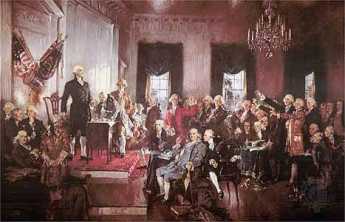
|
| The Constitutional Convention |
It was hard to know where to stop with these arguments. A promise was being made that the nation would prosper with expansions of scale, and in fact, it soon did. It was also foreseen that expansion of the right of the federal government to tax would automatically constrict the ability of the states to do so, and in time the state legislatures have been reduced to begging for federal funds. [At the same time, it seems inconceivable that the Constitutional Convention would have condoned the present discordance between the several states in what federal taxes they pay compared with what federal benefits they receive.] The states' inability to levy troops and declare wars has indeed reduced local power to intervene to block hostilities, not of local concern. There have been occasions to fear that plebiscites for personal freedom may have sometimes impaired the nation's ability to defend itself. Local gasoline and cigarette tax wars occasionally spring up to exploit differences in state taxation, but in general, there remains comparatively little mercantilism at a state level. But regional differences have correspondingly grown, along with the sense of local powerlessness to resist it. The Civil War is only the largest example of a general trend of shifting conflicts into those gaps of jurisdiction unimagined by the framers. Section Eight arguments all rode on the rising tide of the Industrial Revolution; they proved in general to depict correct predictions. But they also persuaded 600,000 young men to die, for or against the Union itself.
Designing the Convention
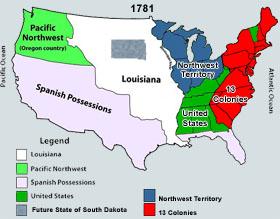
|
| The Convention and the Continent |
THE prevailing notion of the Constitutional Convention once depicted James Madison as seized with the idea of a merger of former colonies into a nation, subsequently selling that concept to George Washington. The General, by this account, was known to be humiliated by the way the Continental Congress mistreated his troops with worthless pay. But recent scholarship emphasizes that Washington noticed Madison in Congress becoming impassioned for raising taxes to pay the troops, was pleased, and reached out to the younger man as his agent. Madison seemed a skillful legislator; many other patriots had been disappointed with the government they had sacrificed to create, but Madison actually led protests within Congress itself. A full generation younger than the General and not at all charismatic, Madison's political effectiveness particularly attracted Washington's attention to him as a skillful manager of committees and legislatures. Washington was upset by Shay's Rebellion in western Massachusetts, which threatened to topple the Massachusetts government, but Shay's frontier disorder was only one example of general restlessness. There was a long background of repeated Indian rebellions in the southern region between Tennessee and Florida, coupled with uneasiness about what France and England were still planning to do to each other in North America. It looked to Washington as though the Articles of Confederation had left the new nation unable to maintain order along thousands of miles of the western frontier. The British clearly seemed reluctant to give up their frontier forts as agreed by the Treaty of Paris, and very likely they were arming and agitating their former Indian allies. Innately rebellious Scotch-Irish, the dominant new settlers of the frontier, were threatening to set up their own government if the American one was too feeble to defend them from the Indians. The Indians for their part were coming to recognize that the former colonies were too weak to keep their promises. With the American Army scattered and nursing its grievances, the sacrifices of eight years of war looked to be in peril.
 The Union is much older than the Constitution. It was formed, in fact, by the Articles of Association in 1774. It was matured and continued by the Declaration of Independence in 1776. It was further matured ... by the Articles of Confederation in 1778. And finally, in 1787, one of the declared objects for ordaining and establishing the Constitution was "to form a more perfect Union. 
|
| A.Lincoln, First Inaugural |
Even Washington's loyal friends were getting out of hand; Alexander Hamilton and Robert Morris had cooked up the Newburgh cabal, hoping to provoke a military coup -- and a monarchy. Because they surely wanted Washington to be the new King, he could not exactly hate them for it. But it was not at all what he had in mind, and they were too prominent to be ignored. So he had to turn away from his closest advisers toward someone of ability but less stature and thus more likely to be obedient. It alarmed Washington that republican government might be discredited, leaving only a choice between a King and anarchy. Particularly when he reviewed shabby behavior becoming characteristic of state legislatures, something had to be done about a system which proclaimed states to be the ultimate source of sovereignty. Washington decided to get matters started, using Madison as his agent. If things went badly he could save his own prestige for other proposals, and Madison could scarcely defy him as Hamilton surely would. Washington could not afford to lose the support of the two Morrises, and still, expect to accomplish anything major. Madison had been to college and could fill in some of the details; Washington merely knew he wanted a stable government and he did not, he definitely did not, want a king. Many have since asked why he renounced being King so violently; it seems likely he was projecting a public rejection of the Hamilton/Morris concept in a way that did not attack them for proposing it. It was a somewhat awkward maneuver, and to some degree, it backfired and trapped him. But Madison proved a good choice for the role, and things worked out reasonably well for the first few years.
 The powers delegated by the proposed Constitution to the Federal Government are few and defined. Those which are to remain in the State Governments are numerous and indefinite. 
|
| J.Madison, Federalist#45 |
Madison was young, vigorous and effective; he held the widespread perception of the Articles of Confederation as the source of the difficulty, and he was a reasonably close neighbor. He was active in Virginia politics at a time when Virginia held defensible claims to what would eventually become nine states. Negotiations for the Northwest Ordinance of 1787 would be going on while the Constitutional Convention was in session, and Virginia was central to both discussions. After conversations at Mount Vernon, a plan was devised and put into action. Washington wanted a central government, strong enough to energize the new nation, but stopping short of a monarchy or military dictatorship. There were other things to expect from a good central government, but it was not initially useful to provoke quarrels. Madison had read many books, knew about details. Between them, these two friendly schemers narrowly convinced the country to go along. As things turned out, issues set aside for later eventually destroyed the friendship between Washington and Madison. Worse still, after seventy years the poorly resolved conflict between national unity and local independence provoked a civil war. Even for a century after that, periodic re-argument of which powers needed to revert to the states, which ones needed to migrate further toward central control, continued to roil a deliberately divided governance.
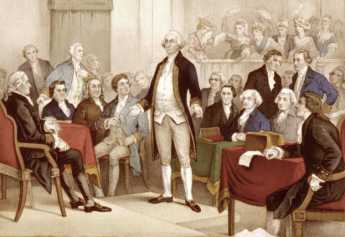
|
| Constitutional Convention |
For immediate purposes, the central problem for the Virginia collaborators was to persuade thirteen state legislatures to give up power for the common good. The Articles of Confederation required unanimous consent of the states for amendment. To pay lip-service to this obstacle, it would be useful to convene a small Constitutional Convention of newly-selected but eminent delegates, rather than face dozens of amendments tip-toeing through the Articles of Confederation, avoiding innumerable traps set by the more numerous Legislatures. In writing the Articles of Confederation, John Dickinson had been a loyal, skillful lawyer acting for his clients. They said Make it Perpetual, and he nearly succeeded. The chosen approach to modification was first to empower eminent leaders without political ambitions and thus, more willing to consent to the loss of power at a local level. Eventual ratification of the final result by the legislatures was definitely unavoidable, but to seek that consent at the end of a process was far preferable because the conciliations could be offered alongside the bitter pills. Divided and quarrelsome states would be at a disadvantage in resisting a finished document which had already anticipated and defused legitimate objections and was the handiwork of a blue-ribbon convention of prominent citizens and heroes. By this strategy, Washington and Madison took advantage of the sad fact that legislatures revert toward mediocrity, as eminent citizens experience its monotonous routine and decline to participate further in it, but will make the required effort for briefly glamorous adventures. Eminently successful citizens are somewhat over-qualified for the job, whose difficulties lesser time-servers are therefore motivated to exaggerate. To use modern parlance, framing the debate sometimes requires changing the debaters. In fact, although he had mainly initiated the movement, Washington refused to participate or endorse it publicly until he was confident the convention would be composed of the most prominent men of the nation. This venture had to be successful, or else he would save his prestige for something with more promise. Making it all work was a task for Madison and Hamilton, who would be replaced if it failed.
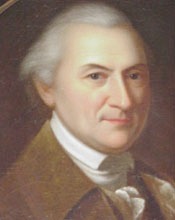
|
| John Dickinson |
While details were better left hazy, the broad outline of a new proposal had to appeal to almost everyone. Since the new Constitution was intended to shift power from the states to the national government, it was vital for voting power in the national legislature to reflect districts of equal population size, selected directly by popular elections. That was what the Articles of Confederation prescribed. But no appointments by state legislatures, please. In the convention, it became evident that small states would fear being controlled by large ones through almost any arrangement at all. On the other hand, small states were particularly anxious to be defended by a strong national army and navy, which requires a large population size. England, France, and Spain were stated to be the main fear, but small states feared big neighboring states, too. Since the Constitutional convention voted as states, small states were already in the strongest voting position they could ever expect, particularly since the Federalists at the convention needed their votes. Eventually, the agreement was found for the bicameral compromise suggested by John Dickinson of Delaware, which consisted of a Senate selected and presumably voting as states, and a House of Representatives elected in proportion to population; with all bills requiring the concurrence of both houses. From the perspective of two centuries later, we can see that allowing state legislatures to redraw congressional districts gives them the power to "Gerrymander" their election outcomes and hence restores to the populous states some of the internal Congressional power Washington and Madison were trying to take away from them. In the 21st Century, New Jersey is an example among a number of states where it can fairly be said that the decennial redistricting of congressional borders accurately predicts the congressional elections for the following ten years. The congressional seniority system then solidifies the power of local political machines over the core of Congressional politics. However, the irony emerges that Gerrymandering is impossible in the Senate, and hence legislature control over their U.S. Senators has been weak ever since the 17th Amendment established senatorial election by popular vote. That's eventually the opposite of the result originally conceded by the Constitutional Convention, but possibly in accord with the wishes of the Federalists who dominated it.

|
| Electoral College Method for Election of the President |
This evolving arrangement of the national legislative bodies seemed in 1787 an improvement over the system for state legislatures because the Federalists believed larger legislatures would contain less corruption because they had more competing for special interests to complain about it. There were skeptics then as now, who wished to weaken the tyranny of the majority so evident in the large states and in the British parliament. To satisfy them, power was redistributed to the executive and judicial branches, which were intentionally selected differently. Here arises the source of the Electoral College for the election of the President. It gives greater weight to small states (and provokes a ruckus among large states whenever the national popular vote is close). Further balance in the bargaining was sought by lifetime appointments to the Judiciary, following selection by the President with the concurrence of the Senate. Without any anticipation in this early bargaining, an unexpectedly large executive bureaucracy promptly flourished under the control of the chief executive, lacking the republicanism so fervently sought by the founders everywhere else. This may be in harmony with the Federalist goal of removing patronage from legislature control, but Appropriations Committee chairmen have since found unofficial ways to assert pressure on the bureaucracy. It's quite an unbalanced expedient. Only in the case of the Defense Department is the balancing will of the Constitutional Convention made clear: the President is commander in chief, only Congress can declare war. Although this difficult process was meant to discourage wars, it mainly discouraged the declaration of wars; other evasions emerged. From placing the command under an elected President, emerges a stronger implicit emphasis on civilian control of the military, loosely linked to the fairly meaningless legislative approval of initiating warfare. There have been more armed conflicts than "declarations" of war, but no one can say how many there might otherwise have been. And there have been no examples of a Congress rejecting a President's urging for war.
And that's about it for what we might call the first phase of the Constitution or the Articles. In 1787 there arose a prevalent feeling that national laws should pre-empt state laws. In view of the need to get state legislatures to ratify the document however, this was withdrawn. The Constitution was designed to take as much power away from the states as could be taken without provoking them into refusing to ratify it. Since ratification did barely squeak through after huge exertions by the Federalists, the Constitution closely approaches the tolerable limit, and cannot be criticized for going any further. Since no other voluntary federation has gone even this far in the subsequent two hundred years, the margin between what is workable and what is achievable must be very narrow. Notice, however, the considerable difference between Congress having the power to overrule any state law, and declaring that any state law which conflicts with Federal law is invalid.
The details of this government structure were spelled out in detail in Sections I through IV. However, just to be sure, Section VI sums it all up in trenchant prose:
This Constitution, and the laws of the United States which shall be made in pursuance thereof; and all treaties made, or which shall be made, under the authority of the United States, shall be the supreme law of the land; and the judges in every state shall be bound thereby, anything in the Constitution or laws of any State to the contrary notwithstanding. The Senators and Representatives before mentioned, and the members of the several state legislatures, and all executive and judicial officers, both of the United States and of the several states, shall be bound by oath or affirmation, to support this Constitution; but no religious test shall ever be required as a qualification to any office or public trust under the United States.
Except for some housekeeping details, the structural Constitution ends here and can still be admired as sparse and concise. That final phrase about religious tests for office sounds like a strange afterthought, but in fact, its position and lack of any possible ambiguity serve to remind the nation of grim experience that only religion has caused more problems than factionalism. Madison was particularly strong on this point, having in mind the undue influence the Anglican Church exerted as the established religion of Virginia. There are no qualifications; religion is not to have any part of government power or policy. By tradition, symbolism has not been prohibited. But government as an extension of religion is emphatically excluded, as is religion as an agency of government. Many failures of governments, past and present, can be traced to an irresolution to summon up this degree of emphasis about a principle too absolute to tolerate wordiness.
IF ALL MEN WERE ANGELS, NO CONSTITUTION WOULD BE NECESSARY
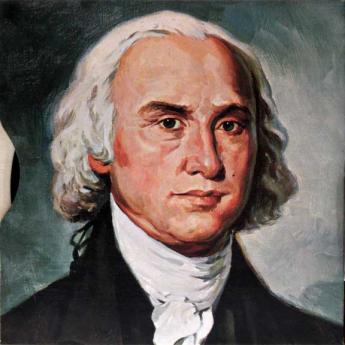
|
| James Madison |
JAMES Madison, Washington's floor manager at the Constitutional Convention of 1787 in Philadelphia, stated the main necessity for holding the Convention at all arose from selfish and untrustworthy human nature. The assembly probably understood exactly who he had in mind, although that is a little unfair to residents of Virginia. He really meant everybody. In the theology of the time, mankind was stained with original sin. Particularly in France, many 18th century romanticists responded to the Enlightenment by defiantly declaring human nature is born pure in heart. In their view, current evils grow from the pollution of civilization, without which it might be possible to have no government at all. At its root, such romanticism was an outcry against progress and civilization, blaming the world's troubles on the Industrial Revolution, so to speak. From Madison's skeptical viewpoint, the most awkward feature of the Romantic Period was its adoption by his Francophile friend and neighbor, Thomas Jefferson, the current American ambassador to France. Madison recognized that Jefferson and Patrick Henry were prepared to assail any attempt to add the slightest power to a central government, particularly if it weakened the power of Virginia. As indeed they promptly came forward to do and nearly succeeded.
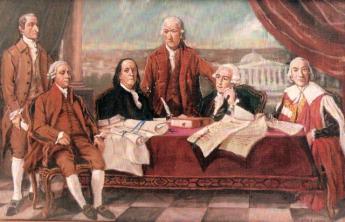
|
| Treaty of Paris |
After fighting an eight-year war for freedom, American belief was wide-spread that it was time to draw back from such anarchy. But there was widespread suspicion in every other direction, too. England seemed to concede, not defeat but only current military overstretch, possibly displaying reluctance to see its former colonies with full sovereignty. George III might wait for America to weaken itself and then try to take them back. Britain almost couldn't do anything right; it was also possibly up to no good when the Treaty of Paris astonishingly conceded land to the Mississippi instead of stopping at the Appalachians. Even our ally France nursed regrets for its somewhat older concessions after the French and Indian War. If even the two mightiest nations of Europe could not maintain order in the vast North American wilderness, perhaps they felt the inexperienced colonies would soon collapse from the effort. Further intra-European wars seemed likely, and could soon spread from Europe to the Western hemisphere. The guillotine was bad enough, Bonaparte would be worse. Our governance as a league of states was in fact, only a league of armies. The Articles of Confederation would not quell inter-state rivalries in peacetime, as only four years (1783-87) experience after the Treaty of Paris were clearly foreshadowing. It was time we listened to Benjamin Franklin, who had been arguing since the Albany Conference of 1745 for unification of the colonies, and to Robert Morris who had been arguing for a written constitution since 1776, a bicameral legislature since 1781, government by professional departments instead of congressional committees, and the ability to levy national taxes -- since at least 1778. Professor Witherspoon of Princeton had provided some ideas about how to make these proposals self-enforcing, Washington was firmly behind a Republican system and opposed to a monarchy. On the other hand, everyone knew that under the Articles of Confederation the thirteen States had often refused to pay their share, abused their ability to deal independently with foreigners, dealt unfairly with their neighbors, and capriciously mistreated their own citizens. It was time to act boldly. With a blue-ribbon convention of national heroes behind these simple ideas, surely it would be possible to convince the sovereign state legislatures to dethrone themselves.
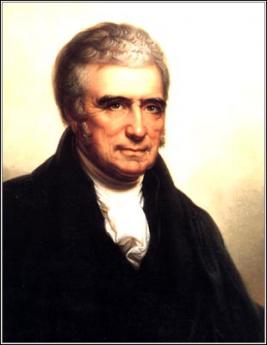
|
| John Marshall |
Two men quietly applied even deeper thinking than that; Benjamin Franklin of Pennsylvania, and John Marshall of Virginia. Both of them had served in state legislatures, both were dismayed by the experience. Franklin also had a long period of close-up observation of the British Parliament, suffering personal abuse there, and had reason to reflect on the earlier abuses by that Parliament under Cromwell during the English Civil War. Certain bad tendencies seemed universal in legislative bodies. Although John Marshall was not a member of the Virginia Constitutional delegation in 1787, he was active in the politics of the group it represented back home. Both Marshall and Franklin had reason to be uneasy about misbehavior in representative bodies, whether called legislatures, congresses, or parliaments. When people said states misbehaved under the Confederation arrangement, they really meant legislatures misbehaved. Franklin did what he could within the Convention to curb this observed behavior by enumerating limited powers and endorsing power balanced against power. When he had nudged it as far as he could, he wearily agreed to give the product a try. Franklin did not trust Utopias, but he had lived among Quakers for years, observing one Utopian society which seemed to endure without resorting to tyranny.
The Constitutional provisions in Article I, Section X became the heart of what the 1787 Convention wanted to change about the relationship of the national and state governments.
States are forbidden to ...
"emit bills of credit, make anything but gold or silver a legal tender in payment of debts, pass any bill of attainder, ex post facto law, or law impairing the obligation of contracts."
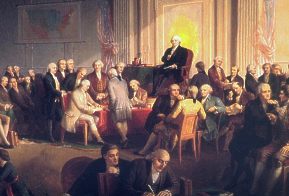
|
| 1787 Convention |
This brief clause is almost a presentment of what state legislatures were doing, which serious patriots regarded as wholly unacceptable. Failure of states to abide by the terms of international treaties must be included in such a summary, although the new Constitution went beyond the powers of states by locating treaties beyond the power of even Congress to change, once ratified. Some observers in fact feel that within the First Article clause, protecting the sanctity of contracts was really the nut of the matter. In one way or another, most states seemed to resort to paying their debts with inflation, somehow failing to recognize that borrowing never pays debts, it only postpones them. The great bulk of this new nation's business was to be conducted as voluntary agreements between two contracting parties. The State -- and the states -- were to stay out of the private sector, except as referee, to see that both sides kept their agreements. As a footnote, the matter of government intervention in private affairs was to rise again in the behavior of the Executive branch in the 1937 Court Packing uproar, and in the 2009 health insurance legislation. Some critics, therefore, have discomfort that the heaviest Constitutional weight was placed by the Founding Fathers on protecting private property. Are not other issues more important, they ask, like life, liberty and the pursuit of happiness? The Founders, of course, we're here not ranking benevolences by value; they were stating principal urgencies for convening the meeting. In a strange unintended way, they here stumbled on the right to property as the foundation for all other rights. But John Marshall understood it was true and was to spend thirty years hammering it into place. People broke individual promises by defaulting on debts; they simply did the same as governments, using inflation.
Go to Delaware, Elephants?

|
| Dead Elephant |
No one is supposed to know where elephants go to die, but if they are smart as people say they are, my suggestion is to search for dead elephants in the state of Delaware. Most taxes, and estate taxes, in particular, are considerably lower, there. At least this was the message Christopher J. Topolewski, Esq. conveyed to the Right Angle Club recently. His firm, West Capital Management, has prepared a table comparing the taxes in the three states that come together at the southeast corner of Pennsylvania, which for residents of the Philadelphia area are within easy commuting distance of each other. Although Delaware has a marriage penalty (one couple is taxed more than the sum of two singles), it has no estate tax at all, no sales tax, and a property tax rate only half that of Pennsylvania, only a quarter of that in New Jersey. For residents of New Jersey, there is almost no tax which is not lower in Delaware, because but ex-Pennsylvanians would then have to be careful to die or cohabit since ordinary income tax and capital gains taxes are higher in Delaware than Pennsylvania. If you must die (and who doesn't?), go die in Delaware.
This was a situation specifically contemplated as a way to discipline greedy state governments, by James Madison when he was formulating the U. S. Constitution. And there is evidence it is working. By happenstance, I once encountered an official of New Jersey taxation, who told me that 43% of New Jersey taxes are paid by 1% of the population. And that 1% was moving out of the state as fast as it could. If it does, the other 99% of New Jersey residents will find their taxes rising by 43%. West Capital reports that taxation as a percent of income is 1.23% in Delaware, 3.46% in Pennsylvania, and 5.82% in New Jersey, suggesting that a selective flight of the 1% would raise the state taxes of everyone else by 43%, and thus make state taxation as a percent of lowered average income rise to roughly 20%. Relating total income to total tax revenues would be an even better way to detect hidden indirect taxes, such as overtaxing utilities in the knowledge it will be passed on to the consumer. I recently discovered that a few years ago, the Legislature got tired of hearing complaints about local taxes, so they transferred half of the local taxes to the state tax. That's pretty much like taking it from one pocket and putting it into another because now all the hubbub is about state taxes. Armed with even partial information, it becomes easier to understand why New Jersey would evict a governor who had been Co-chairman of Goldman Sachs, during a financial crisis. If a financial whiz can't change this, maybe it requires a meat ax.
This is a time of growing restlessness about public spending, and Tea Party revolts are likely to accelerate during the remaining nine months before the next election. The conjecture is growing about a coming deadlock between a Republican Congress and a Democratic President, lasting at least two more years. What might emerge from a strong third party congressional delegation is too arcane to discuss. But at least the Republicans who leave can console themselves they are selectively raising the taxes of Democrats.
It seems almost inconceivable that professional politicians would demonstrate such a forest of tin ears as to let this happen, but the rest of Mr. Topolewski's talk just heated up the fire. His long-scheduled talk was designed to give guidance about the new estate tax laws, but he found himself confounding his audience with the news that there are no new estate tax laws; in fact, there will be no estate tax laws at all after this year unless they emerge from the congressional gridlock we already have. Which apparently will be followed by a gridlock we can scarcely imagine. Imagine asking your lawyer to write a will which straddles the contingencies that there will be no law, that there might be a continuation of the present one, or there might be some new law of quite uncertain wording. One of the suggestions offered is to allow your executor the discretion to accept or disclaim certain hypothetical provisions.
And that brings up an old story. William Penn was the largest private landowner in the history of America, possibly the whole world. He had a trusted agent, who gave him an enormous pile of papers to sign. A busy rich man like Penn is regularly confronted with a discouragingly large number of routine legal documents to sign. So, Penn signed them all, not noticing that one of the various papers in the pile gave the entire state of Pennsylvania -- to his agent. The outcome of the ensuing uproar was that Penn spent six years in debtors prison.
Reversing Madison's Scheme
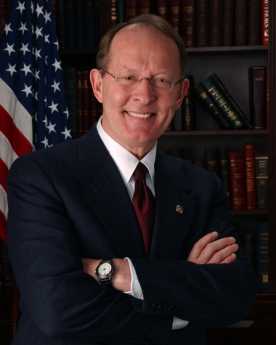
|
| Senator Lamar Alexander of Tennessee |
Senator Lamar Alexander of Tennessee was once the Governor of Tennessee. He, therefore, faced the eternal problem of finding enough revenue to cover the expenditures of the state government, which quickly runs against a barrier. Local taxes cannot be raised significantly higher than in other states -- before the wealthier inhabitants start moving to some cheaper state. In our current era of the welfare state, the federal government has the option of dumping expensive welfare programs onto state governments, as a local responsibility to pay for. The net effect of this maneuver is to attract poor people to move toward states with generous welfare programs, and rich ones to move away. That is, a disincentive has been created for making welfare programs any good. Politicians obviously do not like to discuss this matter openly, so I will take the personal responsibility for stating that this perverse disincentive is the main reason Medicaid is the absolutely worst medical program in any state, chronically underfunded everywhere. Therefore, when Obamacare dumped 15 million uninsured persons onto the Medicaid rolls, it doomed them to underfunded medical care, as they will soon discover.
.jpg)
|
| Constitution |
Since this situation was created by the Constitution, only amending the Constitution can repair it. However, the U.S. Supreme Court might discover enough elasticity in its penumbras and emanations to permit a few demonstration projects, and this discussion proceeds on that assumption. Senator Alexander proposed the federal government trade financial responsibility for Medicaid to the states, in return for accepting responsibility for K-12 education. Horse-trading of this sort might have some political utility, but for demonstration projects, it is surely better to limit the number of variables in order to reach a firm conclusion, sooner. There is always a danger of unintended consequences from shifts of this magnitude, and the public knows it. Therefore, a swap is always twice as politically dangerous as a single experiment. Some other time, or maybe in some other states, but don't mix them up.

|
| Medicare program fact |
In policy circles, there is a knee-jerk reaction that moving Medicaid to the federal government would be to create a "single-payer system", which some people favored, anyway. However, the purest form of single payer would include all medical care for everybody, into Medicare for the elderly. The hidden elixir in only moving Medicaid for the poor into the Medicare program lies in the fact that Medicaid already has a means testing; if you only want to improve the care of the poor, it is undesirable to mix them with everybody else. Presumably, by the time this becomes an issue the Democrats will be anxious to undo what they have done, while the Republicans will be inspired to let them cook in their own juice. However, there will be a brief interval in which the central controversy will seem to be one of repealing Obamacare, so an adroit leader might be able to slip a demonstration project through in the uproar.
The issue of attracting immigrants in the course of designing state welfare programs is a general one, not confined to health care. It is not even confined to the state government, as the vexing problems of a porous border illustrate on a national scale. Think tanks need to put the issue on their permanent discussion list, and foreign experiments need to be analyzed as well.
ARCHITECTURE OF GOVERNMENT: (1) ARTICLES OF STRUCTURE
Although an outstanding feature of the United States Constitution is its brevity, by contrast, the Articles of Confederation which it replaced contained scarcely anything at all. Stripped of boilerplate, the Articles amounted to an oath of perpetual allegiance between thirteen colonial tribes who banded together to fight a common enemy. The document began with a firm statement that the constituent states retained their right to write their own rules. No national rules could be made without the consent of every state. Moreover, since enforcement powers remained with the states, the states could ignore national rules at will, even if they had agreed to the rules. Once the Treaty of Paris concluded the Revolutionary War conferring an immense domain to the East of the Mississippi River, the thirteen states had to decide whether to remain united in a single nation or to parcel out the wilderness into thirteen pieces within a sort of Europe of North America. They tried to continue the Articles for four peacetime years, but their populations were too small for all the tasks. They could no more govern all that territory than they could individually defeat Great Britain in the recent war. Looking ahead for a moment, after another eighty years of immigration, the southern states would reopen that issue, but in 1787 such a demanding adventure seemed too daunting to everyone. While eight years of fighting a guerrilla war loosely bound together might have seemed the most they could do, George Washington now wanted a big nation he could be proud of, and meanwhile, Britain, France, and Spain were still making threatening gestures. It seemed plausible to consider what the new leadership forged in the Revolution could propose, maybe give it a try. George Washington certainly had the stature to step forward and say that the nation need not be bound by that silly wartime oath to make the Articles "perpetual" if the times required a different approach. And that was plainly the case. No one, not even Thomas Jefferson or Patrick Henry who privately disagreed, had the courage to confront the General.
Washington was in the embarrassing position of having made a great show of permanently withdrawing from public life, but he was willing to stage-manage his way around that issue. The greater problem was his inexperience in the design of governments; he had not even gone to college and was uncomfortable about it. His young Virginia neighbor James Madison had studied the matter seriously with Witherspoon at Princeton and was anxious to make a name for himself as the designer of a new government, basking in the protection of the great General. There was general agreement that the New England town meeting version of democracy, based on small towns in ancient Athens, was unsuitable without a better way to expand its size. Well before young Madison appeared on the scene, Great Britain had popularized the Roman Republic as a model, and it became practically a foregone conclusion the United States should be a republic. Local communities should identify some trusted representative to understand and represent their interests within a deliberative body collecting the best interests of the whole nation. Unfortunately, this had been vaguely the concept of the Continental Congress, in which actual governance was conducted through select committees of the Congress. It had really not worked very well, and Robert Morris as acting administrator in 1778 immediately replaced administrative committees with permanent departments of administration, which worked much better. The leaders of Revolutionary America were in rebellion against a heavy-handed King, so they intentionally avoided a chief of state who might get ideas resembling those of Julius Caesar. However, the contrasting experiences of Congressional committees and Morris's permanent departments emerged as fairly decisive after anti-monarchy feelings began to subside. Washington remained adamant he wanted no part of monarchy for himself or anyone else, however. The problem was resolved by recognizing that if a presidency were created, Washington would surely fill the office. It was more or less openly decided it was safe enough to put Washington in the job and let him figure out what to do with it. Unfortunately, Washington was not immortal, was succeeded by a tumultuous Presidency of John Adams, and the nearly disastrous tied election of 1800. While it could be argued that the vagueness of his powers and duties in the eventual Constitution was a necessary concession to the ambiguous requirements of the Presidency of a new nation, the flaws of the Constitution's address of Presidential succession were careless in the extreme. History is replete with hundreds of examples of wars and assassinations associated with the succession of chief executives. For thousands of years, many societies have even concluded that the obvious flaws of hereditary kingship were to be preferred to the chaos which regularly results from trusting the personal ambitions of candidates to sort matters out.
So it was almost a foregone conclusion the new government would have a congress based on the republican model and a president. It was also clear that the British common law was about as good a judicial model as could be devised by any convention, and it had the universal allegiance of the legal profession. To start a new nation it is necessary to have a comprehensive system of laws from the very first day; Congress could later review and modify the common law to suit American needs. What then remained to be decided was the method of appointing judges, a question to which there seems to be no perfect answer in any state or nation. The lawyers in a jurisdiction know well enough who of their number is fair and learned, but it does not always suit their clients to argue before a fair and learned judge; clients only want to win their case. The public might elect judges impartially, but the public is seldom in a position to know the candidates, so it abandons the elections to the politicians. The politicians have their own agendas, and it is unfortunately not considered necessary in some districts for a politician to be impartial or even honest. To become a judge you have to ask who has the power to appoint you. And then you have to ask, what does that person want in return? In some districts, the answer is $100,000 in a campaign contribution. A person who agrees to that condition is not necessarily a bad judge when in office, but if he wants a promotion to a higher judgeship he has to ask the same question: who has the power to promote me, and what does he want? The judicial appointment question seems to have no good answer, but many American lawyers have been persuaded that the British system of the Inns of Court is superior. That system can be roughly summarized as sending a likely youth to "Judge School" in early adolescence and intoning Judicial ethics at him for the rest of his life in a judicial cloister. It must be recalled, however, that Margaret Thatcher hated the Inns of the Court system for some reason, and did her best as Prime Minister to abolish it.
Under the circumstances, the Constitutional solution to appointing judges is the most appealing alternative we have. First of all, the appointment of state and local judges is a matter left to the individual states to decide. Justices of the United States Supreme Court are nominated by the President, appointed by a vote of the Senate to serve for a lifetime, subject only to impeachment proceedings for bad behavior. The Chief Justice (not the President or anyone else in the Executive Branch) is the chief administrator of Federal Courts, which essentially imitate the appointment process of the Supreme Court. It is remarkable how useful a lifetime appointment can be. Insulated from political pressures, federal judges can expect to serve under several different political parties. Except in a few rotten boroughs permanently under one-party control, a politician in power can expect to have any judge he offends, still be a judge after the politician leaves office, but the reverse is usually not the case. Although the rules are different, the effect of lifetime appointment is much the same as lifetime cloistering under the British system, with the exception that it does not apply to the barristers representing clients, as it does in England.
So now we have approximated the three branches of government before the Constitutional Convention has even convened: a republican-style congress, an independently elected executive, and a lifetime judiciary. The genius of the Convention was what they did with this set of expectations.
Articles of Confederation: Flaws
DURING the twenty-five years (1776-1801) government was in Philadelphia, Americans who had rebelled against tight royal rule uncovered many defects in its opposite -- a loose association of states. Loose associations only preserve fairness by operating with unanimous consent, which is, of course, unfair to a thwarted majority, unless a dissenting minority thwarts itself as a gesture of kindness. The Founding Fathers ultimately devised a formula of weakening power by dividing it into layers -- national, state, county, municipal -- and seeking to confine minority dissent to the weakest political unit. Persuasion and peer pressure were given time to work up the ladder of appeal to a wider, more powerful body of citizens. Bottom upward by choice; top-down only in desperation. Furthermore, persuasion first, force as last resort. An implicit third safety valve emerged: if a good idea is smothered by a local concentration of bigotry, appealing to a wider population includes being heard by more viewpoints. No one claims to have authored this whole prescription or foreseen its hidden benefits; it apparently evolved by trial and error. There was another latent discovery for America's sparse population in a hostile wilderness: maintaining harmony was more essential than efficiency. It would be hard to consolidate more Quakerly concepts of governance in one document. Not exactly assembled, it emerged and was admired. The local Quaker merchants were living proof that harmony made riches for anyone, while force only works against weaker people. George Washington the cavalier general came to Philadelphia and gave it a softly Virginian twist, over and over: Honesty is the best policy. It seems to have originated in one of Aesop's Fables.
 It is not necessary that the [Constitution] should be perfect; it is sufficient that [the Articles of Confederation are] more imperfect. 
|
| James Madison |
Recently examined documentation reveals James Madison, the main theoretician of the closed-door Constitutional Convention, to have been severely contemptuous of state legislatures at this time in his life, and rather severely defeated by John Dickinson in a political quarrel in mid-convention about the powers of small states. From this fragile evidence emerges the idea that in balancing the powers of state and national governments in the "federal" system, it may have been someone else's idea that the greater freedom to move out of an offending state into a more favorable one, would appreciably restrain state legislative abuses. Even with this feature built into the system with the national government to enforce it, Madison is said to have been in a state of depression that the Convention refused to agree to his idea of giving Congress veto power over state laws. It took some time for improved transportation to strengthen this competition between states, but it may not be an accident that Delaware now leads the way in responding to the implicit opportunity.
Philosophy and history are different. The Framers gradually acknowledged a patched charter of tribal allegiance was insufficient and thus adjusted to the idea of a central government. They tweaked a decentralized model of governance to get the states out of the road, without antagonizing them so much they would not ratify it. Although it is commonplace to say the Articles of Confederation were a weak failure, the Articles did reflect American attitudes at the beginning of our formative period. The Constitution would not have been acceptable if the Articles of Confederation had not first been given a trial. By the end of the 1787 Philadelphia negotiation, the nature of the final proposal was to define a few absolutely minimum powers for a national government, identify a few other powers as destructive when in the hands of any other level of government, and leave a vast undefined area: where new and novel problems would be tried out in the states, then passed to a national level if necessary. Anticipating constant mid-course corrections was an important objective for even a minimalist Constitution, not the least of those challenges was to create ways to keep it minimalist. Simplicity itself keeps it hard to change. Starting at the bottom of the layers of government continues to this day to introduce new and unexpected problems to the "laboratory of the states" or even lower, working upward only as proven necessary, or spread nationally only after the solution is highly successful. It is a legacy of slavery, the Civil War, and direct election of Senators (Amendment XVII) that many Americans still fail to welcome the merits of this approach, or lack the patience to try it for their pet ideas. Considering the Articles of Confederation and the Constitution as two documents with continuous goals, we got it right, the second time.
And we got it right in the environment of Eighteenth-century Quaker Philadelphia, where a tolerant examination of new ideas was more venerated than in any other place in the civilized world. With a combination of wisdom and impasse, minor issues were left to the future. It is true this sometimes creates problems of neglect. But it makes it possible to define those few issues which must never change. An unexpected virtue of minimalism surfaced eighty years later: many men understood it well enough to die for it.
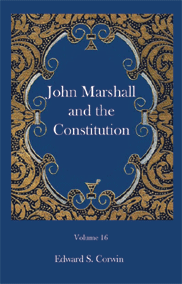
|
|
Edwin Corwin's "John Marshall and the Constitution" |
Much has been written about the separation and balance of powers between the three branches of the federal government. However, the real balance of power in the Constitution in 1787 was vertical, between the central government and the constituent states. Balancing power horizontally, within the central government's branches, is a way of preventing one side of this other argument from tilting the state/federal balance in its own favor, or slowing down the effect of any victories by one side. In other words, it preserved citizen liberty to choose. From this continuing two-dimensional struggle emerges the explanation for filibusters, the seniority system, the confirmation process for Supreme Court and Cabinet appointments. It also calls into question the Seventeenth Amendment, where the state legislatures lost the power to appoint U.S. Senators. In 1786 the states had all the power, in 2009 state power is much diminished; but it is not entirely gone by any means. It is true the cry for states rights, essentially an appeal to the Deity for Justice is futile. If states are to wrest power back from the federal government, it will be by the adroit exercise of powers buried within the balanced powers of the federal branches, but it can succeed if the public ever wants it to succeed. The Framers seem to have overlooked the possibility that federal power could someday outgrow its blood supply, simply growing too big to manage. It is also true the Framers neglected the possibility of a protracted period of disagreement between two halves of the electorate. At least in these particulars, there is room for the further evolution of the Constitutional principle.
While features of the present Constitution can sometimes be linked to the correction of flaws in the Articles, one by one amendment never seemed to be quite enough. Subsequent analysis of Original Intent has often had to contend with the unspoken intent of earlier negotiators to strengthen partisan advantage in later struggles. The political battles being fought at the beginning, which except for slavery are substantially the same today, were sometimes being promoted for reasons which now seem merely quaint. Fine, everyone can agree it was complex. Still, there was a recurring uneasiness: what was the underlying flaw in the Articles? What, as they say, is the take-home point?
One widely accepted summary, probably a correct one, of what was centrally wrong with the Articles of Confederation, lies in a concise observation, which follows, from Edward S. Corwin's book John Marshall and the Constitution:
"The vital defect of the system of government provided by the soon obsolete Articles of Confederation lay in the fact that it operated not upon the individual citizens of the United States but upon the States in their corporate capacities. As a consequence, the prescribed duties of any law passed by Congress in pursuance of powers derived from the Articles of Confederation could not be enforced."
And that's how many Revolutionary Americans, possibly most of them, had wanted to have it. They were in revolt against all strong government, not just the King of England. They surely would have applauded Lord Acton's declaration that "All power tends to corrupt, and absolute power corrupts absolutely." Thirteen years of near-anarchy taught them they must at least give some limited powers to a central government, but it was to be no more than absolutely necessary. For some, the Ulster Scots, in particular, even the absolutely minimum amount was still just a bit too much. In effect, these objectors wanted a democracy, not a republic.
To deconstruct Professor Corwin's analysis somewhat, the equality-driven followers of Thomas Jefferson believed the insurmountable obstacle for uniting sovereign states is that they are sovereign, and won't give it up. The merit-driven followers of Alexander Hamilton, Robert Morris, and George Washington bitterly resisted; in business and in war you need the best leaders to rise to power. The function of common men is to select the best among themselves to be leaders. Only James Madison seems to have grasped that ideal government might tend more toward a republic for purposes of the enumerated federal powers plus enumerated powers specifically denied to the states. For lesser issues, perhaps a purer democracy would be just as workable. However, in operation, it took scarcely a year to discover that the common man would not automatically select the best man he knew to be his representative. In fact, there exists a considerable populist sentiment, that wealth and success outside government are actually disqualifications for office. To some extent, this reverse social Darwinism is grounded in an unwillingness of the upper class to serve in government, perhaps because service to the country interferes with the lifestyle of unrestrained power and wealth which other occupations allow, but is forbidden to public servants. In any event, we persist in the fruitless argument whether America is a democracy or a republic; it was designed to be a mixture of both. Within the time of the first presidency, the unattractive realities of mixing human nature with elective politics transformed the meanings of the Constitutional document to something that was never written there, and other nations have largely failed to grasp. It apparently also worked a major transformation in its main author. James Madison first quarreled with his ally, Alexander Hamilton, and joined forces with the Constitution-doubter Thomas Jefferson. His mentor and idol, George Washington, essentially never spoke to him again.
---------------------------------------------------------------------------------------------------------------
States rights no longer confronts America directly, because the Founding Fathers managed to get around it until the Civil War, and then the Fourteenth Amendment enabled the federal judiciary to attenuate state sovereignty somewhat further without eliminating the architecture of a federation of states. In other words, in two main steps we deprived the states of some sovereignty, but no more than absolutely necessary, and we took more than a century to do it. The European Union currently faces the same obstacle; this is how we solved it. If they can get the same result in some other peaceful way, good luck to them. Our framers used the language "Congress may...or Congress may not..." They only dared to strip state legislature of a few powers because they needed the legislatures to ratify the Constitution, a gun you can only fire once. Thus, they forbade states the right to issue paper money, the power to interfere in private contracts, and such, as enumerated in Article I, Section X, where the operative phrase is "The states are forbidden to..". The framers were willing to strip the unformed Congress of many more specific powers than the all-too-existing states; the Constitution can be read as a proclamation of the powers which any central government simply must possess. There might be other desirable powers, but here is the minimum. After eighty years, individual Southern states asserted their unlimited powers extended to nullification and secession, and because of a perceived need to preserve slavery would not back down. The Constitutional consequence of this national tragedy was the Due Process section of the Fourteenth Amendment, which has since been purported by the Supreme Court to mean that whatever the federal government may not do, the states may not do, either. However, Due Process traces back to the Magna Carta and has been so tormented by an interpretation that for the purpose stated, it is growing somewhat too elusive to remain useful. For historical reasons, we never gave a fair trial to the original proposal to address the federal/state dilemma. The Constitutional Convention was held in confidence, many delegates changed their minds along the way, and many ideas were more perceived than enunciated. It is plausible that the original strategy originated with Madison's teachers and emerged from many discussions, but there were several delegates in attendance with the sophistication to originate it. In a convention of egotists, there were even a few who would put their ideas in someone else's mouth.
The concept of how to curtail power in a non-violent way, can be called Regulatory Competition. Mitt Romney seemingly plans to promote the idea as a central feature of his political run for President of the United States, using a variant he has developed with Glenn Hubbard, the Dean of the Columbia University School of Business. The idea does still work reasonably well with state taxes and corporate regulation. If a state raises a tax, estate tax for example, in a burdensome way, people will flee to a state with more reasonable taxation. Corporations have learned how to shift legal headquarters to Delaware and other states which court them, and in really desperate cases will move factories or whole businesses. There is little doubt this discipline is effective, and little doubt that some cities and states have been punished severely for encouraging an anti-business environment. Whether the Fourteenth Amendment could be cleverly amended to expand this competitive effect without reintroducing segregation or the like, has not been seriously considered, but perhaps it should be. There are however not too many alternatives to consider.
As far as advising our European friends is concerned, it would be important to point out that the original version of Regulatory Competition completely depends for its effectiveness on the freedom to flee to some other state within the union. A common language is a big help to unity, but the ability to move residence is essential, so for practical purposes, both a common language and freedom of migration are required. Underlying such concessions is a sense of tolerance of cultural differences. That is unfortunately where most such proposed unions have either resorted to violence or failed to unite. And of course, the power which might otherwise be abused must then be shifted from the federal, back to a state level. What surfaces is a sort of one-way street? It remains far easier to devolve into little statelets than to unite for the benefits of scale. A working majority under the likes of Thomas Jefferson might have been assembled in the Nineteenth century but was held back by coping with the expanding frontier. During the Twentieth century, it would have been held back by the need to deal with world power. The Second Tea Party seems to have some inclination along these lines, but it remains to be seen whether some overwhelming need for world power will once more overcome the obvious national ambivalence about it.
The revised proposal for the regulatory competition takes the proposal to a different level, possibly a more workable one. Workers in the United States can freely move from one state to another but are restrained by national laws from equally free movement between nations. Removing that barrier makes the European Union attractive, although it inflames local nationalism. Since it seems more palatable to allow the currency to move, perhaps a little tinkering would be sufficient to permit uniform monetary rules to be the hammer which forces nations into permitting free trade on a global scale. The people themselves can remain at home in their national costumes, perhaps perfecting their religions in more churches and language skills in more schools. Meanwhile, the insight of Adam Smith would prevail for the long-term prosperity of everyone. Each party in a transaction feels enriched by it, the seller preferring to have the money, and the buyer preferring to own the goods. Multiplied a trillion-fold, these improvements in everyone's condition result in the steady enrichment of all.
Concessions and Agreements
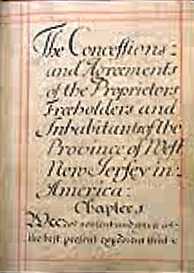
|
| Concessions and Agreements |
The United States Constitution is a unique achievement, but it had significant precursors, many of which James Madison had studied at Princeton. In the days of difficult ocean travel, almost all colonies were bound by an agreement to maintain loyalty to their European owners in spite of receiving latitude to govern themselves. Charters and documents defining these roles were generally written by the owners, and the colonists could pretty much take them or leave them. In the case of New Jersey in 1664, however, a very formidable lawyer and friend of the King named William Penn was drawing up agreements to his own conditions of sale, taking care that the grant of governing authority he received was favorable. Penn's relationship to the King was unusually good, to say the least. He had more reason to be wary of nit-pickers in the King's administration, trying to anticipate every conceivable disappointment for some successor King.
For his part, Penn wanted to make colonial land attractive to re-sell to religious groups who had experienced harsh government oppression; he wanted no obstacles to his announcing there would be no religious oppression in New Jersey. He was offered the role of sub-king although he hastily rejected any such title, and needed to repeat the formalities of the Charter to define his role and reassure his settlers about that matter. Furthermore, he was dealing with the heirs of Carteret and Berkeley, active participants in North and South Carolina. So Penn's method of achieving basic rights was influenced by prior thinking in the Carolinas, as the thinking of John Locke secondarily influenced matters in Delaware and Pennsylvania. These ideas were incorporated in a New Jersey document called "Concessions and Agreements." The concepts were not wholly the ideas of William Penn, but he did write it, and it does contain many ideas that were uniquely his. Understandings about limits were set down, argued about, and agreed to. The owner risked money, the colonist risked his life. Neither would agree unless a reasonable bargain was struck in advance of any dispute. Furthermore, the main value of a colony was beginning to shift from trading rights to real estate rights. Carteret and Berkeley had not only been principals in both the Carolinas and the Jerseys but had been involved in a number of such investments in Africa and the West Indies; New Jersey was just another business deal. It was conventional for documents of this type to define the method of selection of a governor, the establishment of an assembly of colonists, and some sort of council to attend to day to day affairs. In that era, few colonists would cross the ocean without a guarantee of religious freedom, at least for their own brand of religion. Standard clauses which may sound strange in today's real estate world, were then necessary because it was a transfer of not merely land, but also the terms of government. In the case of the Quaker colonies, many of these stipulations were included in the earlier charter from the King. It seems very likely that Penn hovered around and negotiated these points which he wished to have the King agree to; and then once the land was safely his, Penn repeated and expanded these stipulations with the colonists in his Concessions and Agreements . It wasn't exactly a Constitution, but it reads a lot like the one America adopted a century later.

|
| Proprietors House |
Quakers had suffered persecution and imprisonment, and knew exactly what they feared; on the other side, it seems likely Carteret and Berkeley were less interested. So this real estate transfer document conceded almost anything the colonists wanted and the King would stand for, couched in conciliatory phrases. For example, no settler was to be molested for his conscience, and liberty was to be for all time, and for all men and Christians. Elections, by the way, must be annual, and by secret ballot. While law and order must prevail, nevertheless no man is to be imprisoned or molested except by the agreement of twelve men of the neighborhood. On the matter of slavery, no man was to be brought to the colony in bondage, save by his own consent (that is, indentured servants were to be permitted). And in what proved to be a final irony for William Penn, there was to be no imprisonment for debt. Almost all of these innovative ideas survived into the U.S. Constitution a century later, but the most innovative idea of all was to set them all down in a freely-made agreement in writing. This was not merely how a government was organized, it defined the set of conditions under which both sides agreed it would operate.
It was, of course, more than that. It was a set of reassurances to settlers who had been in New Jersey before the English arrived that they, also, would be treated as equals. It was a real estate advertisement to the fearful religious dissenters back in England that it was safe to live here. And it was a reminder to future Kings and Parliaments that this is what they had promised.
The pity and a warning, is that the larger vision of a whole continent governed fairly by common consent may have been too grandiose for a little band of New Jersey Quakers, surrounded as they were by an uncomprehending world. All utopias are helpless when stronger neighbors reject the basic premise. However, it was the expansion of the pacifist concept to the much larger neighboring territory of Pennsylvania that proved to be just too much for such a small group of friends to manage by consensus, particularly when unbelieving immigrants began to outnumber them. But the essential parts of it certainly remained in the minds of delegates to the Constitutional Convention in 1787. When the minutes of the Constitutional Convention speak of the "New Jersey Plan", the Concessions and Agreements was what they had in mind.
REFERENCES
| Concessions and Agreements of New Jersey 1676: William Penn | New Jersey State Library |
| Camden After the Fall: Decline and Renewal in a Post-Industrial City: Howard Gillette Jr.: ISBN-13: 978-0812219685 | Amazon |
Legislative Branch: Two Chambers or One?
The traditional explanation for the two-chamber arrangement of legislative branches is that John Dickinson once crafted a compromise between the big states and the small-state demand for equality. That's accurate, and it's also true that the two-chamber system in Great Britain balances the power claims of the landed aristocracy with the demands of commoners. But only the Pennsylvania legislature of 1777 seems to have addressed head-on the issue of whether, in general, two were better than one. A central issue is whether the two chambers are selected by two distinctive characteristics, not what the characteristics are. By fighting to have only one chamber, the Pennsylvanians inadvertently demonstrated why unicameralism is unwise; shot themselves in the foot, as it were. Big state, little state, or patricians versus commoners, (or any other system of selection) was scarcely a central issue at all; what was essential was to create two bodies, with internal politics necessarily based on different criteria for leadership scheming. Electing representatives for six years rather than two is a minor distinction but it has a certain effect; after all, electing people for life would make a huge difference. Electing geographically, whether by counties as many states do or by state, is not terribly important in itself. What appears to be important is that one body is elected by the population, the other body geographically, and thus there are two different schemes to achieve power. Such differing political machines will seldom agree on a single pinnacle of power, thus undermining one of the central weaknesses of allowing political parties to exist. Washington believed he could achieve this outcome by making it a mark of disgrace to caucus outside of the voting chamber, probably not recognizing that relief from the temptations of tyranny was already built into the system by happenstance.

|
| Founding Fathers |
Bicameral, two-party legislatures seem to soften many of the objectionable features of political parties. Our founding fathers considered many things, but they never made up their minds about enduring political parties. Factions would, of course, appear with each contentious issue, but the modern idea of parties required experience to cope with, and the founding fathers had little experience. They were realists and pragmatists, but the concept of informal little warring governments within the government was a powerful concept they simply did not address. Part of that was due to the implacable resistance of George Washington to the whole idea; no one wanted to confront him on a topic he was so passionate about. His violent temper was famous, and sometimes it was irrational. He expected every senator and congressman to speak his mind on every subject, assuming an equal role from the day he was sworn in. For a while, it almost worked, largely because so many of the early congressmen had been members of the Constitutional Convention, hand-picked to be able to persuade their states to ratify it. But as elections became more routine it became evident that people who were primarily skillful at getting themselves elected would arrive in Congress, only to demonstrate they were lost, ignorant, or preoccupied. They "needed seasoning", out of which grew the seniority system, tending to substitute duration in office for competence and independence of mind; the main idea of seniority was to hold back raw newcomers, just a little. The vast variety of topics for Congress to consider inevitably demonstrated that many congressmen simply did not care what happened to a great many issues, but cared inordinately much about some others. Thus, the newcomers quickly needed a mechanism for trading their votes for "minor" issues in return for voting support on what they thought were "major" issues. As party leaders began to make an appearance, the leader acquired power through the seniority system, which quickly morphed from friendly advice to newcomers, into the warning phrase: "wait your turn".

|
| Henry Clay |
Henry Clay, who had watched the system from the Senate, walked into the House of Representatives in 1811 and was elected Speaker on the first day. He quickly transformed the role of Speaker from an impartial umpire of debate and merged the powers of the Speaker with the powers of the Majority Leader. A supposedly independent Majority Leader still exists but is actually acting the role of the party whip. The true majority leader had pushed the nominal one aside, adding the powers of the speaker to his own. The supposedly impartial Rules Committee is merely an enforcer for the will of the majority party leader, rewarding and punishing Congressional colleagues as the Speaker desires. The volume of work relentlessly increased to over twenty thousand bills a year, so the larger House of Representatives was able to develop specialist experts in many fields which the Senate simply did not have the manpower to parcel out. Those who are familiar with the internal politics of large corporations will recognize the devastating threat of switching such a specialist from a field in which years of experience have been invested, into another field specifically chosen as a punishment, to seem unfamiliar or better still detestable. Speakers and Rules Committees which see themselves as impartial umpires do not do such things. But a power-hungry Majority Leader would laugh about it with his cronies. When a convulsive change of membership like the Tea Party suddenly makes an appearance, abusive leadership has a reason to mellow; but the difference between mellowing and biding your time is a small one.
The Senate has its own rules, so arcane and numerous it takes years to learn them. For present purposes, they are unimportant. The crucial thing is they are different from the House rules and tend to promote a different style of leadership. The leadership of the two bodies thus will usually have a clash of interest, and out of that comes restraint of arbitrary power. A phrase much in circulation within the Tea Party congressmen is that "The other party contains our adversaries, but the Senate contains our enemies." George Washington would not be amused, but Madison would be satisfied.

|
| Boston Tea Party |
The 1777 Pennsylvania Legislature seems to have grasped the idea behind a single Legislative body immediately. The Constitution of the State had been bitterly contested, and one of the main issues was unicameralism. The radicals wanted power for the Legislature, and this was one clear way to enhance it. What the heedless egalitarians did with power once they got it, had a lot to do with persuading the Constitutional Convention ten years later, that John Dickinson's bicameralism had a pretty good idea buried within his Grand Compromise. In retrospect, it can be seen that the victories at Trenton and Saratoga, plus the early successes of the privateer navy, strengthened the other colonies and mostly put moderates in charge; in Pennsylvania however it was the radicals who took over the leadership and started acting on the assumption that radicals were the natural leaders of the rebellion. At least one major cause of this peculiarity was that the British attack was focused on Philadelphia, and moderate forces were forced to flee. While the Continental Congress initially fled to Baltimore as Howe approached Trenton, they briefly returned to Philadelphia until the British were actually on the outskirts of town, and then fled a second time. Because there was general dissatisfaction with Baltimore, this time they went to Lancaster and then across the Susquehanna to the then little town of York. Morris was better prepared than most and had bought the von Stiegal mansion in the Lancaster suburb of Manheim. To the extent it was possible to direct the maritime and financial activities of the Continental Congress from such a distance, he was at least able to do it in moderate comfort. This movement of the Continental Congress may not have caused the radical uprising in Pennsylvania, but it certainly suppressed the moderate forces which would have acted to restrain it.
For practical purposes, The radical legislature got its unicameral wishes and started printing money recklessly, imposing price controls and personal threats against anyone who raised prices. The leaders of the Quakers, with Israel Pemberton ("The King of the Quakers") and several dozen others dumped into oxcarts, were exiled into the Shenandoah Valley of Virginia. James Wilson, obeying a lawyer's duty to defend his clients to the best of his ability, was the target of anger in the streets. A mob of radicals caught the Quakers emerging from the Arch Street meetinghouse and executed two of them. The mob continued a few blocks to James Wilson's house at 3rd and Walnut, and besieged a number of moderates including Robert Morris in the "Battle of Fort Wilson". The moderates were prepared to fight, but the appearance of the First City Troop put an end to the fighting of this revolution within the revolution. To a certain degree, the mob violence seems to have been provoked by food shortages, which were in turn caused by suppression of prices to a level the farmers would not accept. Inflation was raging out of control as the Legislature printed more money and attempted to make farmers accept it by force. A remarkably insightful economist of Philadelphia at the time, Pelatiah Webster, summarized the situation in a few pithy remarks which can scarcely be improved on today. Uncontrolled currency leads to inflation, inflation leads to price controls, and price controls lead to famine. The farmers simply would not sell their abundant crops for such constrained prices, city-dweller starvation notwithstanding. Their action was not violent; they simply withheld goods from the market, waiting for better prices. Price controls were, of course, futile after a very short time. Food riots were the last step before total chaos. Although the fighting stopped, the radicals consolidated their control at the next election, with Robert Morris and others of his sympathizers, turned out of office. After four years of war, things were beginning to fray at the edges.
ARCHITECTURE OF GOVERNMENT: (2) COMPROMISE BETWEEN BIG AND LITTLE STATES SETS THE TONE
Because it was widely expected a new Constitution would devise some kind of republic, the convention in Philadelphia began serious deliberations with how the people might choose their representatives in Congress. Congressmen were mostly selected by State Legislatures under the Articles of Confederation, but there was widespread dissatisfaction with State Legislatures. The voting inclinations of chosen congressmen would undoubtedly reflect how they had been chosen, in a two-step process. If the voting franchise is only given to college graduates, congressmen, for the most part, would predictably be college graduates. If women got the vote, in time many members of Congress would be women. And if poor people got the vote, they would surely outnumber rich people, and might even elect representatives who would seize money from the rich to redistribute to the poor. The experience of Fort Wilson eight years earlier was not only on some minds, but several of the former combatants were sitting in Independence Hall as Delegates, three blocks away. Although the amount owed in debt was the same as the amount loaned, the number of individual debtors greatly exceeded the number of individual lenders, Consequently, the debtors might easily confiscate or injure lenders unjustly. That result had taken the form of ruinous paper money inflation in the recent past and was one of the main reasons the Constitutional Convention seemed necessary. Delegates soon took care that when the issue of state powers came up, states were prohibited from issuing paper money, or taking comparable actions like dishonoring debts. Such rules would at least concentrate the power to create inflation into a single body, the national congress. Meanwhile, the voting franchise would be limited to non-slave male citizens who owned property, to exclude recent immigrants who would probably be mostly poor, as well as carpet-baggers who might be imported by the boatload by some foreign power. Meanwhile, amendments to the Constitution must be made difficult to achieve, partly as a symbol that agreements freely made, must be kept. Parenthetically, there have been only two dozen amendments in two hundred years, a majority of which concern expanding the voting franchise, so the Constitutional Framers accurately assessed the difficulty they created. Unfortunately, the most questionable action they took was to award 3/5 of a vote to slaves, which obviously transferred that voting power to their owners. It may be too much to blame the Civil War on this Constitutional provision, but it certainly warped the direction of affairs leading to the war. Although this provision is difficult to justify in retrospect, it reflected an underlying understanding that Delegates were unlikely to vote for measures which injured the interests of substantial numbers of their members, except for binding concessions in return. This slavery provision was the result of a grand three-way compromise, all of whose provisions make historians squirm, but acknowledge that no Constitution would have emerged from the convention without substantial resolution of the various gridlocks. James Madison drove the convention to revolve around the central principle of compromise, which always seems to be necessary for the democratic process, and always somewhat taints it.
In settling the nettlesome issues of the voting franchise, the delegates proceeded to the principle of proportionality. The assumption was that uniform rules of voter franchise would lead to uniformity among all the states, a concept hard to reconcile with States Rights, and particularly hard to reconcile with slavery. If a state had more voters with the stated qualifications for franchise, of course, that state got more congressmen. Or is that necessarily so? Because Virginia had called for the convention, provided the presiding officer in the form of George Washington and the leading scholar of government in James Madison, and most of all because Virginia was the most populous and richest state, Virginia was oblivious to any way of organizing a republican congress except strict proportionality. But John Dickinson of Delaware, the smallest state of all, proceeded to teach Virginia a lesson. Dickinson had been the penman of the Articles of Confederation, was probably the best-educated lawyer in America, and a serious thinker about representative government. He had been Governor of both Pennsylvania and Delaware, probably had a major hand in the separation of the two states, and was a man of substantial wealth and fame. Dickinson is said to have drawn Madison aside and made a strikingly incisive analysis of national mergers, possibly entirely original with himself. If thirteen states are merged, some will be larger than others. Therefore, as long as the biggest remains the biggest, it will have the most votes in Congress. A lawyer of his experience would know that a political component with the most votes will relentlessly seek to warp the laws in its own favor, and will believe that to be an entirely natural thing to do. But the consequence of this situation will be that the smaller states will be perpetually consigned to a fate of seeing the rules warped against them. That's neither fair nor reasonable, and Dickinson wouldn't have it. So, unfortunately, it would be necessary for him to gather the nine votes in the convention (the delegates voted by states, one vote per state) from small states, and defeat the three large states (Virginia, Pennsylvania, Massachusetts) on this particular point: Do you want a Constitution or not? We are told that Madison, who had won almost every vote up to this time, began to lose every vote afterward. This man Dickinson meant what he said, and it became evident that another compromise was going to be necessary. That should please Madison, the great advocate of compromise. We are told that the necessary compromise was here suggested by Benjamin Franklin in a taproom. There would be two houses of Congress, a House of Representatives and a Senate, and legislation would require the approval of both. The House of Representatives would elect members proportional to population, thus favoring big states with big cities, and the Senate would receive two votes per state, regardless of size, thus favoring small states with sparse rural populations. Because it was going to be necessary for the Constitution to seek ratification by the states, the Senators would be appointed by the states, usually the state legislature. This second great compromise has received great acclaim, both for its success and for its ingenuity. Unfortunately, it has two ominous flaws, just beginning to emerge after two centuries.
In the first place, populations grow and shift with time, making equitable bargains lose their fairness. Virginia is now far from the largest state and may come to regret its bargain made under other circumstances. And we have fifty states, not thirteen; most of the newer ones are far larger geographically than the original ones. In time, some or many of the new states may develop large populations as California has done. Hawaii, The Philippines, Puerto Rico, and unknown others might, however, skew the numbers toward smaller states. Since the electoral college is tied to the sum of the two houses of Congress, unexpected results are a possibility. Because the House of Representatives was frozen to 534 members in 1925, the degree to which two votes per state will compensate for proportionality is quite uncertain in the future. Because of our national tendency to wait for something bad to happen before we act to correct a flaw, it seems likely that something disruptive will occur before we consult with mathematicians to devise a floating relationship between the two methods of congressional selection. Meanwhile, it seems like a good topic for dissertations.
The second flaw in the system also arises out of population growth. On the only occasion when George Washington stepped down from the podium to debate a point, he did so to urge that no congressman should represent more than 30,000 constituents. At present, the average congressman represents 600,000 constituents, and the number is constantly growing. Long ago, the House of Representatives recognized that their size was beginning to interfere with the ability to deliberate. Even now, the number of congressmen has grown to a size where crowd management techniques have been applied to member disadvantage, and by their own elected leaders. Since the unfortunate manipulation of members, especially new members, was begun by Henry Clay and Martin VanBuren, it has many more causes than member overcrowding. [For example, the Rules Committee controls the agenda, and the Speaker controls the Rules Committee. Henry Clay's politicization of the Speakership is an offense to the Constitution.] But overcrowding is certainly now at a practical limit, while representation is twenty times more dilute than the Father of our Country thought was wise. Once more, something disastrous will probably have to occur before this situation is addressed by its present beneficiaries, but at least a few scholars should start thinking about it. One suggestion would be to elect sub-congressmen at a ratio of twenty to each of the 534, with assignments to them of duties now performed by Congressional staff.
Finally, it is inadequately perceived that the accumulation of compromises between the interests of the different states, inexorably led to creating the Electoral College, for which there is no visible substitute. It does not mandate casting a winner-takes-all vote of its College Members, but it might as well because it effectively limits one state's maximum voice to the agreed number under a winner-take-all system. Here is reflected the fact that the Constitution is a bargain between the states, almost all of whom achieved some questionable advantages for themselves. But having established a working balance of such advantages, no state is able to discover some new loophole and increase its voting powers with it. Far from being a quaint anachronism, the Electoral College is a keystone which assures that any state which tries to unbalance it, will be confronted by a substantial number of states with something to lose.
Advantages and Disadvantages of Being a Small Country

|
| very pleasant |
LIVING in a small country seems to be very pleasant, and many people prefer it to the hustle, bustle and high taxes of living in a large country. Unfortunately, big neighbors are tempted to conquer and enslave you. Aside from this one disadvantage, many people would prefer a simple, quiet life among blood relatives, all tending to think the same way. It's one step above tribalism, and maybe it's a form of peaceful tribalism.

|
| Measles |
But our evolutionary ancestors didn't think they could afford this luxury. They lived in a strange wilderness filled with fierce aborigines who often took a notion to scalp you, even if you were willing to become a hunter-gatherer like them, because they scalped other hunter-gatherers, too. And they were good at making war. Later historians sometimes contend that European settlers only gained a foothold in the New World because the Indians had been weakened by smallpox, measles, and other contagions which advanced ahead of the exploring Europeans. English settlers along the Atlantic coast were able to overcome the Dutch and Swedes who preceded them, but the French in Quebec and the Spanish in Florida were a greater threat. Worst of all enemies were the rulers of England, who seemed to think it was natural to enjoy the benefits of the New World without the nuisance of living there. A century or more of conflict from the enemies who surrounded them had pretty well convinced the English Atlantic settlers that they simply had to get bigger and stronger. Otherwise, one of the many enemies surrounding them would eventually succeed in what seemed to be a universal goal: conquest.
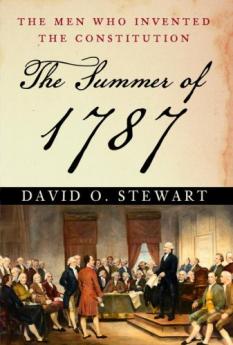
|
| The summer of 1787 |
The colonists had learned one other thing. Their own loose federation of small peaceful states was in some ways worse than rule by an outside King. The Confederation had been constantly reluctant to surrender local power to a unified defense; almost by definition, an invader was better disciplined than the defenders of a loose tribal alliance. The defense alliance had few advantages for keeping local bickering under control and was definitely less effective with families and children to protect against a mobile force of adult male warriors. The Confederation barely held together during an eight-year war against a common enemy, and it was rapidly coming apart after peace was declared in 1783. The English and French could see all this, too. Once they settled their own war with each other, each of them planned to envelop the former colonies. So George Washington and James Madison gathered the Best and the Brightest together in Philadelphia in the summer of 1787, intending to construct a practical plan for what almost all the colonists wanted: a Union. A Union strong and big enough so other nations would leave them alone. A Union was benign enough so its citizens would enjoy the same Liberty they had as a loose alliance. Divided informally into four interest groups, each of the four needed concessions to be made. But each also needed to leave the other three feelings they had gained something important as the price of surrendering to what some other group could not do without. Having found the vital concessions, it was then still necessary to tinker and re-balance, so that everyone could still "live with it". In essence: 1) The South had to be given time and forbearance to work out its difficult problem of slavery, moral qualms notwithstanding. 2) The nine small states had to be protected against perpetual domination by the three big ones, of Virginia, Pennsylvania, and Massachusetts. 3) If America was to realize the full advantage of growing from thirteen states to fifty, existing old states must not take advantage of new ones. 4) Political revolution was not the end of it; there was also the Industrial Revolution. Fishing, lumbering, farming, trade, and cotton, would in some way need to accommodate banking and manufacturing, assisting rather than upsetting other compromises. Given these tangled issues, it would be a long, hot summer in Philadelphia.
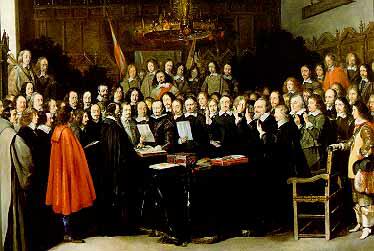
|
| Treaty of Westphalia in 1648 |
Three of the four main problems were obvious, demanding to be addressed. Slavery was obvious from the start; you either solved this problem or the South would walk out. The western wilderness was bigger than existing America; it too could not be ignored. And finally, huge variations of climate and resources led to local specialization; a marvelous thing, if you could trust your suppliers and customers to cooperate. But curiously, none of these issues got directly to the political problem the Constitutional Convention was meant to solve, which was unifying thirteen different sovereignties, each of which was prepared to get up and walk out. The modern nation state was created by the Treaty of Westphalia in 1648; its guiding principle was mutual respect for local sovereignty. Having pacified over a hundred contentious central European states, it required a great deal of self-assurance for anyone to flout it. It seemed hard to imagine any way to remain sovereign, without commanding a vote equal to that of other sovereignties. The delegates from the State of Delaware, which had separated from Pennsylvania within the past decade, were "prohibited [by their legislature] from changing the Article in Confederation establishing an equality of votes among the States". Just what agitated the minds of the Legislature of Rhode Island was kept private, but something about a Union bothered them so much they refused to send delegates to Philadelphia even to discuss Union. After they assembled and started having dinner together at taverns, and later as they were beginning to vote in coalitions, one thing began to emerge. The small states banded together, hung out together, talked alike, and began to vote alike. Their emerging leader was John Dickinson of Delaware, the author of the Articles of Confederation, and very likely one of the prime agitators in the lower three counties of Pennsylvania -- breaking off from Pennsylvania and becoming the State of Delaware. Furthermore, Dickinson had been Governor of both Delaware and Pennsylvania, so he was very familiar with the deplorable behavior of the Legislature of Pennsylvania, now and for decades in the past. It took a long time for this sly old political operator to show his cards, but when he did, he gave James Madison the shock of his life. Madison, the near neighbor of George Washington and leader of the Virginia delegation, the author of the Virginia Plan, and the clear authority on the politics of government in America was busily consumed with working out the details of the emerging Constitution. Obviously, it went to his head a little, and so he was dumbfounded when Dickinson drew him aside in the corridor to tell him he wasn't going to have a Constitution at all. Dickinson was walking around with the votes in his pocket of five or six of the nine small states and was telling Madison that the small states were fed up, and not going along. Young Madison was suddenly confronted by the most respected lawyer in America, whose timing was perfect. For what may have been the first time in his life, Dickinson fully revealed the depth of his annoyance, that the big states would always take the little ones for granted. That the little ones were always expected to be deferential to the big fellows in charge of the big states. And then the clincher: "I would rather risk conquest from a foreign state than being forever dominated by my larger neighbors." That put it in a nutshell. If the only reason for joining a Union was to be protected from foreigners, Dickinson wasn't so sure he preferred his coalition partners. Evidently, this was the feeling of most of the other small states at the Convention, and it may well be the feeling of all small states, anywhere and everywhere.
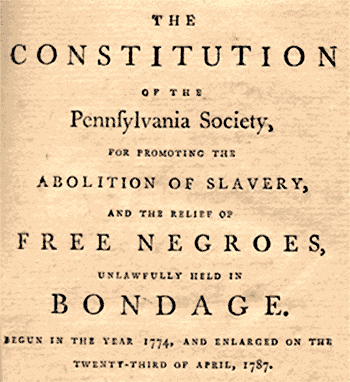
|
| Promoting the Abolition of Slavery |
Once the Convention got the idea, solving it became comparatively easy, but why waste an opportunity? There is a good reason to suppose it was Ben Franklin, silent as a cat watching a mouse, who matched it up with slavery. His fellow Pennsylvania delegate, James Wilson, had prepared the way by starting the discussion of granting 3/5 representation for slaves, but it had received comparatively little notice in the previous few weeks. Franklin rammed it home, adding a sop to the large states by according to the House of Representative sole power to introduce money legislation. Two of the main issues of the convention were solved with one agreement, small-state representation, and slavery. Who can say how long he had been nursing this idea. He had agreed to be president of the Pennsylvania Society for Promoting the Abolition of Slavery, about a month before the Constitutional Convention began. Prior to that, he and his wife had owned a slave or two, for many years. On June 2, the society adopted a resolution to end the slave trade and presented it to Dr. Franklin, asking him to present it to the Convention. He never did, explaining later it was "advisable" to let the matter lie over. In August, Alexander Hamilton blocked a similar resolution from the New York Manumission Society, even though he had been a fervent lifelong opponent of slavery.
Political Effects of Increasing Population
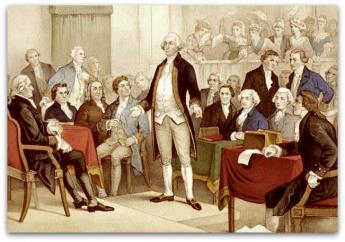
|
| Washington got down off the platform and debated the Constitution |
The only time George Washington got down off the platform and debated the Constitution, was near the end of the Convention. The topic was the maximum size of Congressional districts. He strongly urged the Convention to limit the size of a district to thirty thousand inhabitants. Since then, the population has grown in both absolute and relative size, so the average Congressional district now contains 600,000 citizens. Madison had contributed the idea that a larger state or district would likely contain more diversity, hence fairness, and it would likely contain more citizens of high intellectual distinction. It seems likely Washington had heard him say that and held a strongly contrary view. Washington seems to have won this argument since, after more than two centuries of steady growth, few today would hold the quality of congressional representation has improved. Or, that over the centuries of experience, larger states have tended to produce more distinguished Senators. Or that dense urban populations have produced unusually brilliant Congressmen. Indeed, there is a defensible position that the rest of the nation has a prejudice against politicians with urban backgrounds, and reach a private determination not to advance their interests. That by itself might conceivably discourage urban politicians from seeking leadership positions, or even notable political positions of any sort. In the long run, perhaps it doesn't matter what the underlying reasons are, what truly matters is the evidence that legitimate urban interests are somehow being injured by our system of governance.
Perhaps a case could be built that this should be so and is, therefore, a product of good governmental design. It can easily be shown that taxes per capita rise steadily with population density, probably secondary to the rising cost of a safe and sanitary environment. Urban centers are the normal place to expect immigrants to concentrate, almost surely as a result of slum creation when previously dominant populations flee to the suburbs. These residents are almost surely fleeing to areas of less crime, lower taxes, and better public education. All three of these issues are products of government, which was presumably designed to enhance their attractiveness.
A case can be made in the other direction, too, although it sounds more like a Medieval walled city being praised. Transportation and defense are easier, and more esoteric enhancements to industry formation like talent clusters and capital formation, are encouraged. Once you get away from subsistence farming, it's easier to feed and water an urban population and take away its trash. All this has a cost of course, which can roughly be summarized as the cost of air conditioning and sanitizing one of Charles Dickens' Victorian smog basins until it looks like Canary Wharf or Rockefeller Center. There is, of course, the unspoken preference for the military heroes who defend us in their spare time. Everyone would prefer to be defended by hunters and fishermen, then by garment workers who normally prefer violin quartets as recreation. Since the threat of war is never quite extinguished, this by itself might explain the political dominance of the outdoorsman. Even the trial lawyer is not an adequate defender of the faith; his bespoke tailoring would be tattered and torn, without the bailiffs standing silently behind him, ready to supply the muscle.
It this a fair assessment of our experience with district size, or equal apportionment of two senators per state in the other body of Congress?
In the first place, the Founding Fathers took little account of political parties. Small states will almost always fear big neighbors and will band together to defend smallness against bigness. John Dickinson put this proposition to James Madison in the most direct of all possible ways, as a political fact of life. As a leading representative of a large state, Madison was stunned to learn for the first time, what small states had always muttered among themselves. Small states are always looking for allies against invaders, and in the intervals between invasions, were on the constant lookout to prevent neighboring large allies from dominating small ones. They are alert to signs that one big neighbor was about to be replaced by a different one. In the beginning, the big states were Virginia, Massachusetts, and Pennsylvania. Today, they are Texas, California and New York. Whatever the shifts in the future, and however torpid the medium-sized states will be, you can be certain that Rhode Island, Delaware, and Vermont will adjust their positions to recognize the shift. This is their game, and they are good at it. Ever since Dickinson collared Madison in the corridor of Independence Hall, they have owned the U.S. Senate, and all the Senate can do for them.
The big states of Texas, California and New York will be as oblivious of the small states as Madison's Virginia once was. They will consider themselves entitled to leadership, and will alternate between swapping power and betraying each other. The much-deplored lack of civility in politics today is mainly a reflection of the present stalemate at this level. Since none of the big states is close to a majority of votes, the present political "action" is on the level of forming coalitions of medium-sized states. When the big states can't win for themselves, they ordinarily pay off the spear-carriers. The Constitution was designed to empower the large states in the House of Representatives, where they have large delegations. At this level, un-anticipated events took place, because local party bosses were able to control the urban political machine at the primary elections. The resulting urban political machines thus had to be dealt with, at the state and national levels. The trade-off which mostly resulted was for the local machines to assist the national party in other states through alliances with other big-city machines, mostly in selecting Presidential candidates. In return, the national organization assists the financial partners of the local machines. The power of labor unions is fast fading in this role, but other beneficiaries would surprise most people. More than a hundred years ago, the Philadelphia political machine invented the system of single-payer graft at the behest of some trolley-car magnates. Growing tired of petty graft from the local tavern owners on their trolley lines, they approached the mayor with the proposal of a single payment of graft in return for the power to assign it in whatever way the political boss chose to do. Ever since that time, utilities have been the main source of urban political funding, currently reaching out to health insurance companies as tame political contributors. Small wonder that health insurance in return has been taking the strange national twists and turns we all read about.
ARCHITECTURE OF GOVERNMENT: (3) SEPARATION AND BALANCE OF POWERS
The Founding Fathers were in general heatedly opposed to the idea of a domineering monarchy, but frankly disappointed with the lack of energy displayed by the unicameral Continental Congress under the Articles of Confederation. They were more or less satisfied with the Judiciary and the Common Law, although there had been instances of rebellion against Governor-dominated colonial Judges. James Madison tells us in the Federalist Papers that he was greatly taken with Montesquieu's concept of the division and balancing of powers. Probably as a result of the prodding of Madison, the Constitutional Convention's favored system of readjusting this arrangement was to increase the number of centers of power while setting these centers against each other in order to maintain a balance. A concept which gained popularity at the convention was to attempt to give these centers the power to defend themselves, presumably against other centers competing for the same power. The President thus had veto power over acts of Congress, but Congress had partial power to override the veto. Congress could declare war, but the President as Commander in Chief. The President was given the power to execute the laws, but Congress controlled his purse. The Federal Government had control over international and interstate affairs, but the states had control of almost everything else. Although it took a few years for Chief Justice John Marshall to assert it, the U.S. Supreme Court had the right to declare acts of Congress (and the President) to be invalid because unconstitutional, and the Supreme Court had the underlying right to declare what the Constitution meant. On the other hand, the President appointed the federal Judges, with the consent of the Senate. The Chief Justice conducted impeachment proceedings against the President, the Congress had to agree with the decisions. In subsequent centuries, many little tweaks have been added to this system of governmental components holding each other in check, because it takes time for imbalances of power to be discovered and exploited. The general concept was to encourage centers of power to expand and innovate while counting on internal jealousies to hold this "energy" in check.
It's often difficult to guess in advance whether a check and balance system is truly balanced, but over time it is possible to see instances where it has become unbalanced. For example, it was clearly the original intention of the Constitutional Convention and its Ratifying Legislatures that the national government should have only a limited role in adjudicating boundary disputes between the states, interstate commerce and the like, and fairly expansive powers to regulate international treaties and relations, but hardly anything more. Over a period of time, however, it is clear that the central power has come to brush aside the powers of the states. The high point of the original power of States Rights was probably achieved in 1795 with the Eleventh Amendment. This Amendment, the achievement of Charles Ingersoll of Pennsylvania, forbids a citizen to sue a state in Federal Court. Since that leaves the citizen with only the right to sue a state in its own state courts, state power is clearly expressed in the right of the state to decide whether it wishes to be sued. Ever since that time, however, state power has been steadily diminished, ultimately depriving the state legislatures of their power to select the United States Senators of their states in the Seventeenth Amendment. With this steady loss of state power, it is possible that enough sovereignty has been lost to make it impossible to enforce the Eleventh amendment. This amendment was the product of the Progressive Movement of the late Nineteenth century, which now can possibly be seen to have reached its own reversal point in 2012, with Chief Justice John Roberts' opinion that the Federal Government may not dictate terms of state Medicaid programs through the threat of withholding Federal funds from the programs. It remains to be seen whether this change of direction is temporary, or the beginning of a trend. In any event, here it is demonstrated how the balance of power may be shifted, and long-standing imbalances may be corrected by small internal shifts, operating over long time periods.
Another major shift in power, almost the opposite of what the Founding Fathers passionately intended, is the increase in Presidential power. Although the Revolutionary War was fought about the excessive use of power by the British monarch, as much as about anything, there is now little question that the American President has more power over this nation than the British monarch has over his own. This trend can also be seen to have resulted from a series of small actions, over centuries of time. Many millions of Americans now listen intently to Presidential candidates presenting or refusing to present, "their" policies and programs for the following four years. The Articles of Confederation did not even provide for an executive branch, and the inclusion of one in the first draft of the Constitution was viewed with alarm by many citizens. It is hard to read the Constitution today without concluding that it was the original intent to leave policy to Congress, and implementation of that policy to the executive. Whether the Court will reverse this trend, whether the Congress will rebel against its loss of power, or whether we will continue toward an elected monarchy -- remains to be seen.
At the other extreme, we can see the fiercely defended power of the various components of the Department of Defense to retain their independence. The Air Force had comparatively little difficulty establishing its independence of the Army Air Force, and it can be seen that some of this independence rests on the differing engineering requirements of airplanes, tanks, and submarines, as taught in the service academies. But an argument can be made that the military services would be a stronger military force if they were combined in a single unit of warfare, and undoubtedly it is true that this would be a less expensive arrangement. Despite the unquestioned efficiencies, however, this separation of powers has so little chance of reversal that most congressmen would not consider it worth their time to investigate the merits.
In conclusion, it is not possible to be certain whether separation and balancing of powers is a good way to run a country or not. It is merely the way we have chosen to do things in this country. We are not likely to change it as long as we can boast we have the only durable Union of states the world has devised voluntarily. The strong inclination to continue a system which seems to work is likely to overpower any inclination to criticize it. In spite of the evidence that the system would permit further excursions toward the centralized government, we are committed to resisting. And in spite of evidence from the military forces that drift of this sort can be stopped if there exists the determination to stop it.
Separation and Balance of Powers
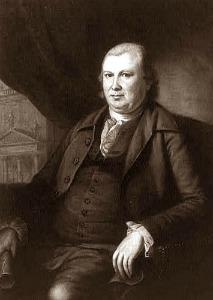
|
| Robert Morris |
At first glance, the Articles of the Constitution today seem entirely descriptive, but they originally identified power and, only after protracted debate, the decision where it should best be assigned. The Constitution primarily speaks of separation of powers, not so much balance of powers, as in 19th century British foreign relations. Separating powers weakens them; balancing weakens them further. Sometimes, the original intent was flexibility. The notion of separating Kings from Parliaments, and both of them from the Courts, dates back at least to the Magna Carta. To Americans, a preference for bicameral Legislative branches is most plausibly traceable to the Pennsylvania Legislature in 1787, with Robert Morris doing battle against a headstrong unicameral body. The vertical division of power among federal, state and local lines occasionally provoked difficulties, but mainly eases confusion. Even when separation fails to quiet matters, clearer lines of separation usually prove to be required, not clever methods of balancing. Separating rather than balancing powers has been our preferred system, and for us, it often proves sufficient.
However, short little James Madison had also cast about for resources to bestow on weak states and weak government departments as protection against bullying by big ones. His life displayed an instinctive avoidance of systems requiring the weak to appeal to the strong for protection, only to find they had acquired a new master. He reasoned that state governments are able to modify state laws to the disadvantage of neighbors, and should retain that ability. He employed the concept that sovereignty began with the states and should remain there. Resulting interface friction is now seen in sales taxes at border crossings, or varying income and estate taxes. But all fifty states are restrained from laying unreasonable burdens on their own citizens by the threat those citizens might then move to another state. Although it is counter-intuitive, abusive tax systems collect less tax revenue by raising rates than by leaving them alone. In extreme cases, whole industries shift location. The outcome is that state governments have less scope for legislation that if they had no peers able to retaliate. James Madison has every right to be pleased with state legislatures slowly responding to the reality he created. Not merely that states must match taxes with neighbor states, but that fairness is the best policy.
To return briefly to comparison with the present debates of the European Union, speculate what advantage might be found in taking Madison literally on treating states as sovereign nations. Europe in 2012 struggles with the same problem America faced in 1787, made more difficult by diversity of languages and folklore of national sovereignty, made urgent by the failure of alternatives. The European leaders reasoned it was easier to unify nations piecemeal; start with monetary policy and work out more difficult problems later. That may seem to point to the same final result, but it does not teach the same lesson. Behind this dubious assessment of relative difficulty was the clear determination in Brussels to use a heavy hand with nationalists; pay no attention to referenda, avoid them if possible. A seeming advantage of first unifying monetary policy is that no one seems to understand it, thus transferring power to those who gruffly pretend they do. Unfortunately for this approach, it is the citizens' nation to do with as they please; they will eventually remind you of it. There is consequently little choice but to educate them to the advantages of Madison's self-disciplining systems. Essentially, keep it simple and don't hide the problems. Half the world probably does not believe honesty is the best policy, maybe even half of Europe. But we adhere to it, not because of Washington's Farewell Address, but because it seems to work.
A practical example of cross-border discipline concerns monetary policy itself, in 1913 when the American Federal Reserve system was created. The Governor of the Texas Fed soon decided to lower local interest rates to the advantage of Texas, just as he had always done. Within days, interstate bank deposits and loan originations switched direction, with everyone looking for Texas loans and no one willing to keep deposits in Texas banks; the independence of Texas banking simply vanished. What emerges is a general principle: there exists hidden pressure for inter-state prices to be uniform, despite constant overt pressure to respond to local conditions. Freed of state regulation, trade moves in the international direction. If both forces happen to pull in the same direction all will be well, but if they go in opposite directions the whole state or nation will be made to suffer for it, usually by blocking other features of bilateral trade.
At the moment, corporation taxes provide the sharpest focus for the power of uniform sovereignty. The nation to get the attention of the world was not 1787 America, but 2001 Ireland, historically a bit leftish. The Irish abruptly lowered their corporate taxes to 12.5%, attracting a sudden massive migration of Swedish, German and English corporations to headquarter in Ireland. Since Ireland is primarily agricultural, the new corporations prompted a sudden migration from the countryside to Dublin, thus generating an urban housing boom. When the boom collapsed there was alarmed commentary, but the observers who really noticed were the world's other finance ministers. Although the boom did get out of hand, the finance ministers mostly noticed that lower corporate taxes attracted business to Ireland. In spite of massive national deficits, England has since lowered corporate tax rates from 28% to 26% and proposes to lower them to 24% in 2012. (Including state taxes, the USA imposes a 40% rate). A century of theorizing that corporations are unfairly doubly-taxed had not provoked any comparable gold rush to match the Irish experience. Other nations will soon follow, and ultimately corporate taxes may go to 0%. But finance ministers are mindful of the ensuing Irish housing crash from going too fast, and therefore may take a decade to get to the end of cutting. They will surely cut until corporate taxes are uniform among major trading nations, as they probably should have been for a century. Those who are slow will now be punished for it by the markets. James Madison the main visionary of this theory, deserves a statue in the main square of Europe, right away.
ARCHITECTURE OF GOVERNMENT: (4) MAJORITY RULE
Although republican forms of government were almost entirely supplanted by despotism in various guises for two thousand years after Julius Caesar, this neglect of democracy was seldom tinged with criticism of majority rule until the Eighteenth century Enlightenment, when majority rule became more of a possibility. The disturbing discovery that a majority could abuse a minority just as thoroughly as a king might begin to haunt the thoughts and writings of the opponents of despotism. Even the proponents of Vox populi, vox Dei est ("The voice of the people is the voice of God") had difficulty threading a way between accepting the tyranny of the multitude, and rejecting majority rule. It is, therefore, a pity the secrecy of the American Constitutional Convention prevents us from knowing whether the gradations of majority decisions which emerge from a reading of the final document, was the product of a single mind or an evolving consensus. As Alexander Hamilton pointed out in Federalist No. 84 and Federalist No. 85, the language of the Constitution is riddled with exceptions to generalizations which the Convention had reached by majority vote:
Independent of those which relate to the structure of government, we find the following: Article 1, section 3 clause 7-- 'Judgment in cases of impeachment shall not extend further than to removal from office, and disqualification to hold and enjoy any office of honor, trust or profit under the United States, but the party convicted shall, nevertheless, be liable to indictment, trial, judgment or punishment according to the law.' Section 9, of the same Article, clause 2 -- 'The privilege of the writ of habeas corpus shall not be suspended, unless when in cases of rebellion or invasion the public safety may require it.' Clause 3 -- 'No bill of attainder' etc., etc."
Hamilton was, of course, arguing that no Bill of Rights was necessary, because ample latitude had been provided for the writers of rules to make nuanced exceptions when the rules are created, or else amended afterward by the elected legislatures. Nevertheless, a Bill of Rights became the first item of business of the new Congress under the Constitution. Even in the age of the Enlightenment, despotism was still so much the rule that most people could only think in terms of an occasional exception for egregious circumstances. In a sense, this limitation of Royal or other prerogatives began with the Magna Charta of the 12th century, and many Englishmen believed that a Constitution merely exists in order to spell out broad limitations of sovereignty. Many opponents of the Constitution voiced the opinion that a monopoly of the armed forces essentially confers unlimited sovereignty on whatever entity has such military power, so what was left to define was the handful of limitations which rebels would be willing to die to preserve. Many otherwise unexplained provisions of the Constitution are merely implicit statements of this intent. We are fortunate that Hamilton went on to illustrate the nature of the concern about one feature of the internal debate about amendments to the Constitution. There existed an uneasiness that nine states might conspire to surprise the others with an amendment for reasons only known among themselves. Therefore, the Constitution requires a 2/3 vote to introduce an amendment, but a 3/4 vote of the states to ratify it. In at least one uninvolved state therefore, the people outside the conspiracy must have a chance to examine and debate the issue. One must credit at least one doubter among the Founding Fathers with imagining a sly strategy which has never been attempted, and blocking it without accusing anyone of even imagining it.
Unanimous consent is of course qualitatively different from majority rule. The requirement for unanimous consent had proved to paralyze the Articles of Confederation. It implied that no legislation would ever seem so beneficial to a preponderance of the states, that no matter how trivial the injury to a single remaining state, it must not be allowed to pass. Any rule short of unanimity implies that some segment of the population must occasionally suffer some degree of injury in order to serve the best interests of the others. In practice, of course, it means compromise, one regular feature of which is honoring the implicit debt the others owe to the victim state, on later legislation where interests lie in other directions. That comes in various degrees of severity, so in some cases, it may be necessary to insist on a supermajority for enactment, perhaps two thirds, or three fourths. It is no more a shame to defeat a supermajority by one vote than it is to get one vote more than half. And halves come in different guises, half of those present and voting, or half of the eligible members of the whole body. Furthermore, the majorities or supermajorities may come in different venues: a bill must pass both the House and the Senate, and then be signed by the President, who is allowed the face-saving escape of a pocket veto when Congress adjourns. Or combining veto power, combined with a second chance to enlist a vote to over-ride that veto. In the case of Amendments to the Constitution, all of the participating branches of government are given a chance to defeat it. In the case of Judicial actions, decisions are stratified within the Judicial Branch. A district court establishes the facts, an appeal court judges the application of the law, and the Supreme Court can judge the constitutionality of the law. Although these last distinctions do not appear in the Constitution itself, they do reflect the Constitution's intent to introduce subtlety into what is, in general, majority rule. With all of these variants of the strength of a majority or minority, an opportunity is created to vary the degree of pain which a majority might inflict on a minority, or else the damage a minority can inflict on the best interests of the community as a whole. It's called flexibility.
ARCHITECTURE OF GOVERNMENT: (5) UNIFORMITY
Passenger trains of Europe are often praised as superior to our own. There are some bullet trains that go faster than any American train, and there are examples of trains which arrive more promptly than ours do. Mostly, Europeans have more train traffic than we do, so service is perceived as better. More serious European defects are less easily noticed, however. For example, the width between tracks varies between different nations can vary a great deal, causing a stop to change the wheels as you travel between nations. The disruption at the border between France and Spain is particularly notable, and between former Communist countries and capitalist ones. Even between the Netherlands and certain neighboring countries. Still less noticeable are differences in nuts and bolts, electrical wiring systems, and the threads of screws. If notice is taken, a tourist is offered the explanation that this dates to earlier concerns about invasions, Blitzkrieg and the like. Quaint.
 The section on Patents and Copyrights is the only clear example in the Constitution, suggesting uniformity is innately a good thing to encourage. It conflicts with absolute liberty, a little, but it discourages needless individualism when that causes needless friction. 
|
The only overt passage in a document which seems to express a preference for national standards is the clause creating national patents and copyrights. After all, the Constitution would have to be ratified by state legislatures, who might take offense at being criticized for deliberately inconveniencing the citizens with incompatibilities between local products and imported ones. But the preference for national uniformity was clear enough from this one implicit prohibition of state latitude, combined with liberal quoting of Madison's views of how citizens could discipline despotic state government -- by moving their residence to a more enlightened state. You don't move to Wyoming because of nuts, bolts, and screws, but you can dis-elect your local legislator for doing something the Founding Fathers frowned upon. And, as Mr. Dooley is famous for saying, the Supreme Court reads the newspapers. Corn is corn and eggs are eggs, but the Industrial Revolution provided many more opportunities for sharp behavior of this sort than a rural nation would provide. And by being new and novel at the time, deliberate nonuniformity was easily noticed, and all the more irritating.
Patent Pending
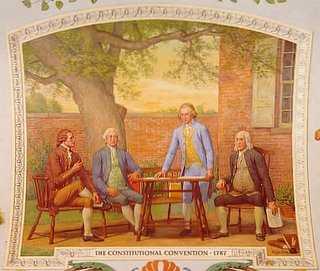
|
| Constitution |
Most of the members of the Constitutional Convention of 1787were also members of the early Senate and Congress during the time when Philadelphia was seat of government. The Constitution had made provision for copyrights and patents "for a limited time", and the early Congresses fixed a reasonable time as seventeen years. A couple of years ago, Congressman Bono sponsored a law, widely supposed to be for the benefit of her constituent Walt Disney extending the time to 99 years. Since the creation of monopolies for a limited time was stated to be for the purpose of encouraging innovation, lawsuits were promptly filed with the contention that 99 years was essentially unlimited, and in any event, would throttle innovation. In the Eldred case, the U.S. Supreme Court reluctantly held that it was up to Congress to decide how long was a limited time, meanwhile expressing its dismay at the earlier Congress which had allowed the time to be so extended by what is widely reported to be a log-rolling contest among lobbyists. The disgust of the Supreme Court was very thinly disguised in its opinion, which quite obviously hoped for Congress to take another look at what it had done.
So now the question arises, of how such a strange provision got to be in the Constitution in the first place. The >members of the convention were mostly farmers and plantation owners, quite recently returned to civilian life after struggling with King George III over governmental intrusion into trade and commerce. Why ever would these people, who were otherwise so parsimonious in their rules and principles, think to intervene in patents and copyrights? It has been suggested that Thomas Jefferson, who was a writer and an inventor, might have been the source of this provision. Unfortunately, Jefferson was three thousand miles away during all of the Constitutional Convention, and was quite dismayed with the completed Constitution when he later returned.
It's a job for some graduate student in American History, looking around for something to write his thesis about. James Madison kept extensive secret diaries of the interior arguments at the Convention, and Benjamin Franklin's Collected works run to over eighty volumes. Surely, among all those scribblings by quill pens, can be found some revealing references to the originator of the bizarre little patent clause. And if it turns out to have been anyone except Ben Franklin, it will be a great surprise. Surely there is a broad hint in the fact that for many years the Franklin Institute essentially was the U.S. Patent Office. Just think for a moment of the value of holding a patent on the invention of electricity. Makes Microsoft seem rather trivial. And as for a comparison with Mickey Mouse, well, really.
ARCHITECTURE OF GOVERNMENT: (6) POLITICAL PARTISANSHIP
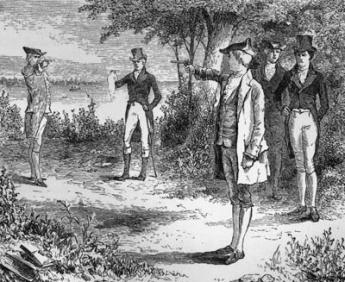
|
| Hamilton and Burr Duel |
Alexander Hamilton, John Jay, and James Madison collaborated in 85 essays, published in the newspapers to win over New York State to ratify the proposed 1787 Constitution as written (which meant approving it without further amending it). The collected essays are now known as the Federalist Papers , authored under the collective pen name of Publius. They were written in great haste during the period before the New York ratifying convention, so there are signs of lack of coordination between the authors. Most of the articles were written by Madison, so his contributions scarcely paused for thought before going on to another topic.
Madison's paper, now called Federalist No. 10, is thought to be the most famous of the group, possibly the most influential. However, its theme is that wide diversity of opinion in a large republic will neutralize itself and therefore eliminate partisanship. Nothing could be farther from what turned out to be the case, however, since Madison himself was one of the principal actors in the drama which soon and apparently permanently established the dominance of the two-party system. As a further irony, his main opponent was his co-author Hamilton. This change of heart, never satisfactorily explained, was particularly bitter on a personal level. Washington essentially never spoke to Madison again, in spite of the close personal collaboration of the two in engineering the Constitutional Convention, the Bill of Rights, and the cultural characteristics of the republic. Unless someone discovers hidden documents from the time, it is likely we can never be certain whether Madison's change of heart was a result of Jefferson's persuasion or persuasion by events. Some conspiracy theorists have suggested that Madison never believed what he said in No. 10, while other cynics point out that Washington could merely offer him fame, but Jefferson was in a position to make him President. Unfortunately, Madison's subsequent presidency was an undistinguished one, and some have pointed to his switch as early evidence of unreliability. In any event, he did reverse positions from regarding partisanship as the main destroyer of republics to coming very close to proving it in the War of 1812. Perhaps he was merely reading the handwriting on the wall. Partisanship has been a constant feature of the nation ever since the election of 1800, and traces of it can be found much earlier than that.
It remains a possibility that Madison's switch was the result of this bookworm's faulty analysis of the roots of partisanship in a republic. His opinion was necessarily based on criteria other than personal observation. There had been no good models to examine since the fall of the Roman Republic in 44 B.C., and even these historical events had been highly mythologized. The essential activity which nourishes partisanship is vote-swapping. When many different issues are laid before a representative of a district, it is inevitable to value some more than others, even to the point of trading his meaningless votes (meaningless to him, or to his district, or both) for more valuable considerations. Sometimes these considerations can be dismissed as corruption, but most commonly the consideration is personal advancement. The congressman needs the votes of other congressmen to advance in the power structure, and it is usually in the interest of his district for him to advance. Whatever he does in the arena of party politics seldom betrays his district, but often involves betraying some fellow representative. It is in this sense that party politics are "dirty". However, the durability of two-party systems allows personal distinctions to be buried within a party label, thus constraining the main concerns of the district to an absolute minimum of choices. There is no need to debate proportional representation; an unconstrained election process itself forces compromises which drive the party toward the center in order to win. In those nations with splinter parties, it is necessary to bargain and compromise after the election in order to achieve a governing majority, so the bothersome public is shut out from participating in the "deals". The essential decisions in coalition governments are often made by a handful of leaders, many of whom achieved party leadership by highly questionable methods. Without saying one word about political parties, our Constitution drives us to a two-party system.
Madison argues in No. 10 that a multiplicity of competing interests would make it progressively more difficult for political parties to remain stable. It is a reasonable argument, which has been reformulated to mean that durable parties must engineer loyalty to a few broad enduring themes, in order to survive from era to era. Rich versus poor would seem a suitable theme, rendered somewhat unsuitable by America's ideal of the poor immigrant, rising in the scale of things to become a rich immigrant or rich immigrant grandson. In recent years, the argument emerged that we should selectively seek immigrants with talents or wealth, thereby enriching our whole nation. As such refinements of a larger theme appear, parties can change. The D's and the R's have completely switched positions on the tariff, for example, and on federal taxation. A constant state of percolation has not had the effect Madison imagined; partisanship has proved stronger than issues. Paradoxically, as parties shift their ingredients of appeal, they become more alike, and the country comes closer to a dead tie in national elections. National balloting is probably not perfected to the point where it can withstand repeated examples of nearly tied elections, so this tends to stabilize may eventually destabilize itself. Tinkering with the election process is viewed with suspicion by the public. So, in the long view of things, perhaps the Constitution has it right. The best policy about political parties is to have no policy.
REFERENCES
| The Federalist Papers: James Madison ISBN-13: 978-1936594405 | Amazon |
Political Parties, Absent and Unmentionable
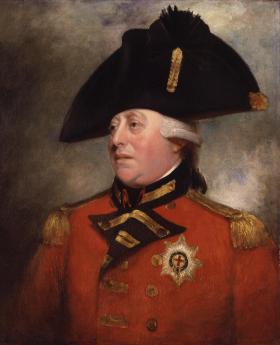
|
| King George III |
BECAUSE America had recently revolted to rid itself of King George III, the Constitutional framers of 1787 sought to construct a government forever free from one-man rule. Inefficiency could be accepted but central dictatorial power, never. It is unrealistic however to expect a wind-up toy to keep working forever, and our Constitution creates the same worry. After two centuries, some chinks have appeared.
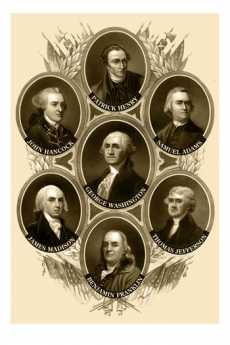
|
| Founding Fathers |
Political parties existed in 18th Century England and Europe, but the American founding fathers seem not to have worried about them much. Within ten years of Constitutional ratification, however, Thomas Jefferson had created a really partisan party which naturally provoked the creation of its partisan opposite. James Madison was slowly won over to the idea this was inevitable, but George Washington never budged. Although they were once firm friends, when Madison's partisan position became clear to him, Washington essentially never spoke to him again. Andrew Jackson, with the guidance of Martin van Buren, carried the partisan idea much further toward its modern characteristics, but it was the two Roosevelts who most fully tested the U.S. Supreme Court's tolerance for concentrating new powers in the Presidency, and Obama who recognized that the quickest way to strengthen the Presidency was to weaken the Legislative branch.
Dramatic episodes of this history are not central to present concerns, which focuses more on the largely unnoticed accumulations of small changes which bring us to our present position. Wars and economic crises induced several presidents, nearly as many Republicans as Democrats, to encourage migrations of power advantage which never quite returned to baseline after each crisis. Primary among these migrations was the erosion of the original assumption of perfect equality among individual members of Congress. A new member of Congress today may tell his constituents he will represent them ably, but when he arrives for work he is figuratively given an office in the basement and allowed to sit on empty packing cases. This is not accidental; the slights are intentional warnings from the true masters of power to bumptious new egotists, they will get nothing in their new environment unless they earn it. Not a bad idea? This schoolyard bullying is a very bad idea. If your elected representative is less powerful, you are less powerful.
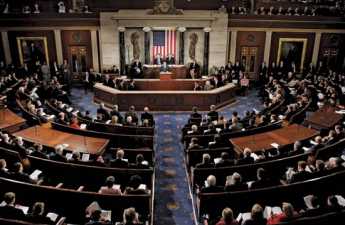
|
| Houses of Congress |
Partisan politics begins with vote-swapping, evolves into a system of concentrating the votes of the members into the hands of party leaders, and ultimately creates the potential for declaring betrayal if the member votes his own mind in defiance of the leader. The rules of the "body" are adopted within moments of the first opening gavel, but they took centuries to evolve and will only significantly change direction on those few occasions when newcomers overpower the old-timers, and only then if some rebel among the old timers takes the considerable trouble to help organize them. In the vast majority of cases, after adoption, the opportunity to change the rules is then effectively lost for two years. Even the Senate, with six-year staggered terms, has argued that it is a "continuing body" and need not reconsider its rules except in the face of a serious uprising on some particular point. Both houses of Congress place great weight on seniority, for the very good purpose of training unfamiliar newcomers in obscure topics, and for the very bad purpose of concentrating power in "safe" districts where party leaders are able to exercise iron control of the nominating process. Those invisible bosses back home in the district, able to control nominations in safe districts, are the real powers in Congress. They indirectly control the offices and chairmanships which accumulate seniority in Congress; anyone who desires to control Congress must control the local political bosses, few of whom ever stand for election to any office if they can avoid it. In most states, the number of safe districts is a function of controlling the gerrymandering process, which takes place every ten years after a census. Therefore, in most states, it is possible to predict the politics of the whole state for a decade, by merely knowing the outcome of the redistricting. The rules for selecting members of the redistricting committee in the state legislatures are quite arcane and almost unbelievably subtle. An inquiring newsman who tries to compile a fifty-state table of the redistricting rules would spend several months doing it, and miss the essential points in a significant number of cases. The newspapers who attempt to pry out the facts of gerrymandering are easily gulled into the misleading belief that a good district is one which is round and compact, leading to a front-page picture showing all districts to be the same physical size. In fact, a good district is one where both parties have a reasonable chance to win, depending for a change, on the quality of their nominee.
So that's how the "Will of Congress" is supposed to work, but the process recently has been far less commendable, and in fact, calls into dispute the whole idea of a balance of power between the three branches of government. We here concentrate on the Health Reform Bill ("Obamacare") and the Financial Reform Bill ("Dodd-Frank"), which send the same procedural message even though they differ widely in their central topic. At the moment, neither of these important pieces of legislation has been fully subject to judicial review, so the U.S. Supreme Court has not yet encumbered itself with stare decisis of its own creation.
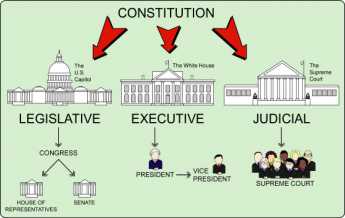
|
| Three branches of government |
In both cases, bills of several thousand pages each were first written by persons who if not unknown, are largely unidentified. It is thus not yet possible to determine whether the authors were affiliated with the Executive Branch or the Legislative one; it is not even possible to be sure they were either elected or appointed to their positions. From all appearances, however, they met and organized their work fairly exclusively within the oversight of the Executive Branch. Some weighty members of the majority party in Congress must have had some involvement, but it seems a near certainty that no members of the minority party were included, and even comparatively few members of highly contested districts, the so-called "Blue Dogs" of the majority party. It seems safe to conjecture that a substantial number either represent special interest affiliates or else party faithful from safe districts with seniority. The construction of the massive legislation was conducted in such secrecy that even the sympathetic members of the press were excluded, and it would not be surprising to learn that no person alive had read the whole bill carefully before it was "sent" to Congress. It's fair to surmise that no member of Congress except a few limited members of the power elite of the majority party were allowed to read more than scattered fragments of the pending legislation in time to make meaningful changes.
The next step was probably more carefully managed. No matter who wrote it or what it said, a majority of the relevant committees of both houses of Congress had to sign their names as responsible for approving it. Because of the relatively new phenomenon of live national televising of committee procedure, the nation was treated to the sight of congressmen of both parties howling that they were only given a single day to read several thousand pages of previously secret material -- before being forced to sign approval of it by application of unmentioned pressures enabled by the rules of "the body". When party members in contested districts protested that they would be dis-elected for doing so, it does not take much imagination to surmise that they were offered various appointive offices within the bureaucracy as a consolation. As it turned out, the legislation was only passed narrowly on a straight-party vote, so there can be a considerable possibility of its likely failure if the corruptions of politics had been set aside, with members voting on the merits. Nevertheless, since this degree of political hammering did result in a straight-party vote, it leaves the minority party free to overturn the legislation when it can. The prospect of preventing an overturn in succeeding congresses seems to be premised on "fixing" flaws in the legislation through the issuance of regulations before elections can open the way to overturn of the underlying authorization. Legislative overturn, however, is very likely to encounter filibuster in the Senate, which presently requires 40 votes. Even that conventional pathway is booby-trapped in the case of the Dodd-Frank Law. The Economist magazine of London assigned a reporter to read the entire act, and relates that almost every page of it mandates that the Executive Branch ("The Secretary shall") must take rather vague instructions to write regulations five or ten times as long as the Congressional authorization, giving the specifics of the law. The prospect looms of vast numbers of regulations with the force of law but written by the executive branch, emerging long after the Supreme Court considers the central points, years after the authorizing congressmen have had a chance to read it, and well after the public has rendered final judgment with a presidential election. The underlying principle of this legislation is the hope that it will later seem too disruptive to change a law, even though most of it was never considered by the public or its representatives.
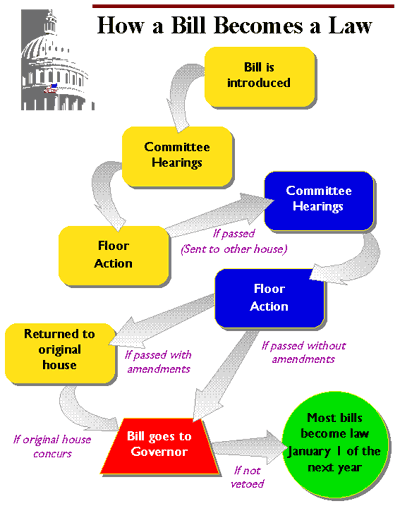
|
| Bill become a Law |
The "regulatory process" takes place entirely within the Executive branch. Congress passes what it terms "enabling" legislation, containing language to the effect that the Cabinet Secretary shall investigate as needed, decide as needed, and implement as needed, such regulations as shall be needed to carry out the "Will" of Congress. Since the regulations for two-thousand-page bills will almost certainly run to twenty thousand pages of regulations with the force of law, the enabling committee of Congress will be confronted with an impossible task of oversight, and thus will offer few objections. The Appropriations Committees of Congress, on the other hand, are charged with reviewing every government program every year and have the power to throttle what they disapprove of, by the simple mechanism of cutting off the program's funds. Members of the coveted Appropriations Committees are appointed by seniority, come from safe districts, and are attracted to the work by the associated ability to bestow plums on their home districts. By the nature of their appointment process, unworried by the folks back home but entirely beholden to the party bosses, they have the latitude to throttle anything the leadership of their party wants to throttle badly enough. The outcome of such take-no-prisoners warfare is not likely to improve the welfare of the nation, and therefore it is rare that partisan politics are allowed to go so far.
The three branches of government have become unbalanced. These bills were almost entirely written outside of the Legislative branch, and the ensuing regulations will be written in the Executive branch. The founding fathers certainly never envisioned that sweeping modification will be made in the medical industry and the financial industry, against the wishes of these industries, and in any event without convincing proof that the public is in favor. This is what is fundamentally wrong about taking such important decisions out of the hands of Congress; it threatens to put the public at odds with its government.
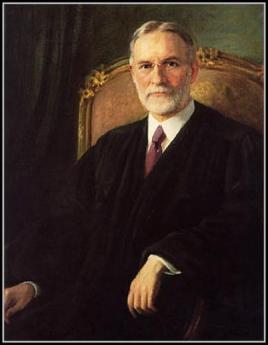
|
| Justice George Sutherland |
There is no need to go further than this, harsher words will only inflame the reaction further than necessary to justify a pull-back. And yet, the Supreme Court would do us mercy if it doused these flames; the Supreme Court needs a legal pretext. May we suggest that Justice George Sutherland, who sat on the court seventy years ago, may have sensed the direction of things, short of using a particular word. Justice Sutherland recognized that although it is impractical to waver from the principle that ignorance of the law is no excuse, it is entirely possible for a person of ordinary understanding to read law in its entirety and still be confused as to its intent. He thus created a legal principle that a law may be void if it is too vague to be understood. In particular, a common criminal may be even less able to make a serious analysis. Therefore, at least in criminal cases, a lawyer may well be void for vagueness. In this case, we are not speaking of criminals as defendants or civil cases of alleged damage of one party by a defendant. Here, it is the law itself which gives offense by its vagueness, and Congress which created the vagueness is the defendant. Since we have just gone to considerable length to describe the manner in which Congress is possibly the main victim, this situation may be one of the few remaining ones where a Court of Equity is needed. That is, an obvious wrong needs to be corrected, but no statute seems to cover the matter. The Supreme Court might give some thought to convening itself as a special Court of Equity, on the special point of whether this legislation is void for vagueness.
We indicated earlier that one word was missing in this bill of particulars. That would be needed, to expand the charge to void for intentional vagueness, an assessment which is unflinchingly direct. It suggests that somewhere in at least this year's contentious processes, either the Executive Branch or the officers of the congressional majority party, or both, intended to achieve the latitude of imprecision, that is, to do as it pleased. Anyone who supposes the general run of congressmen voluntarily surrendered such latitude in the Health and Finance legislation, has not been watching much television. Given the present vast quantity of annually proposed legislation, roughly 25,000 bills each session, the passage of a small amount of vague legislation might only justify voiding individual laws, whereas an undue amount of it might additionally justify a reprimand. However, engineering laws which are deliberately vague might rise to the level of impeachment.
Joseph Story on Politics Under the Constitution

|
| Joseph Story |
The structure [of the Constitution] has been erected by architects of consummate skill and fidelity; its foundations are solid; its compartments are beautiful, as well as useful; its arrangements are full of wisdom and order; and its defenses are impregnable from without. It has been reared for immortality, if the work of man may justly aspire to such a title.
It may, nevertheless, perish in an hour, by the folly, or corruption, or negligence of its keepers, THE PEOPLE. Republics are created by the virtue, public spirit, and intelligence of the citizens. They fall, when the wise are banished from the public councils because they dare to be honest, and the profligate are rewarded, because they flatter the people, in order to betray them.
REFERENCES
| A Familiar Exposition of the Constitution of the United States: Containing a Brief Commentary on Every Clause, Explaining the True Nature, Reasons, and ... Designed for the Use of School Libraries and General Readers; Joseph Story: ISBN-13: 978-1886363717 | Amazon |
Government Features Under Stress
A flexible and adaptable Constitution is not exactly the same as a "Living" Constitution, which has come to imply the courts can amend it without the nation following prescribed procedure for amendment. An exception is made for strictly judicial issues, so some observers prefer to focus on that nebulous boundary. What seems to be missing is a way for the public to express the feeling that liberties are being taken with the Constitution, without reaching for drastic remedies like impeachment. Mr. Dooley famously remarked that the Supreme Court reads the election returns, but it often has more affection for stare decisis than the public does.
Manipulation of the Legislature.
The founding fathers spent much time and energy wrangling about the size of electoral districts, generally agreeing that larger districts produced a better representative. James Madison was persuasive that poor people would always greatly outnumber rich ones and would follow the example of the French Revolution in stripping rich people of their property, with disruptive consequences. Possibly because the Industrial Revolution made a much larger proportion of the population prosperous, or possibly for other reasons, the much-predicted outcome did not significantly occur. Rather, we have seen progressive waves of new immigrants start at the bottom of the economic ladder and work upward in a generation or two. Rather than view poor people as a permanent underclass, we can mostly regard poverty as one stage in a process which usually leads to better positions in society. At the present time, the argument about the relative sizes of the economic classes has devolved into a debate about the optimum size of the immigrant class, which in turn depends mostly on our ability to assimilate those who cannot assimilate themselves. Nevertheless, Hannah Arendt and others have taken Madison at his word and searched the Constitution for clever ways in which that notorious schemer might have had his way. Somehow, the provable fact that affluent classes exercise their right to vote more vigorously than indigents do is taken to be proof of the Madisonian outcome. President Barrack Obama apparently saw some sort of political opportunity in the statistics, and we are therefore likely to hear more about this.
 The representatives of the people immediately turn their backs to their elective constituencies after the election and begin to address their new main concern, which is how to deal with their new colleagues. 
|
 Influencing elected colleagues is their life; elections are periodic threats to that career. 
|
It can be predicted that Americans will continue to prefer the approach of achieving equality by making poor people richer, to the alternative of making rich people poorer. But it can also be safely predicted that grumbling about republican (representative) government will continue, because of certain features of human nature that were poorly anticipated by the founding fathers. Although it should be obvious we have long outgrown any plausible alternative, the representatives of the people immediately turn their backs to their elective constituencies after the election and begin to address their new main concern, which is how to deal with their new colleagues. If they are fortunate enough to represent a "safe" district, they may not even pause to reflect much on the electorate at election time. They are not to be blamed for this; influencing elected colleagues is their life; elections are periodic threats to that career. It should thus be immediately clear that voters can most readily increase their influence on legislative bodies by maintaining a roughly even balance of political parties within their districts. In a word, gerrymandering has become a far more important obstacle to voter influence than race and social class will ever be. Gerrymandering in the House of Representatives, that is, because the Senate and other districts with immovable boundaries cannot be gerrymandered. Our system requires boundaries to react to population changes; therefore the control of legislative boundaries must somehow be removed from political control. The simplest approach would seem to be to avoid all mention of techniques and specifics, except one. The election should be voided unless it produces a reasonably balanced outcome; one that approximates the vote split of the entire state. Another measurement objective might be to reduce protracted incumbency in cases where boundary adjustments prove impractical.
 A sincere representative of the people often finds his worst enemies are the leadership of his own party, seeking to control his vote. 
|
 Political families pass these secrets around within the political class, and we become more of an aristocracy than we imagine. 
|
Once elected, a sincere representative of the people often finds his worst enemies are the leadership of his own party, seeking to control his vote. The methods employed to gain power over the freedom of a representative to vote his conscience are numerous, devious and highly effective. The consequence of this game is that experience is so much the master over innocence that families pass these secrets around within the political class, and we become more of an aristocracy than we imagine. No doubt the rules of the chamber evolve over decades or even centuries and respond to realities which most outsiders cannot appreciate. In all probability, the key to making reasonable rule changes is to transform the rules committee into a committee of the whole for a longer time, perhaps a whole week, at the beginning of each session. It is the nature of politicians to scheme in an elaborate game of chess, and it would be unwise to create the chaos of protracted rule modification as part of some devious contraption. But limiting rule changes to a single voice vote at the beginning of a whole legislative season is also unwise.
What might help is drawing the attention of think tanks and colleges to this clandestine issue. In rural state capitols, the first need is for the creation and funding of think tanks, now largely absent. As the newspaper industry experiences relentless shrinkage, philanthropic attention may well be necessary. The assiduous attention of lawmakers to these mundane issues is such that the publication of a few books on the topic might achieve enormous benefit.
Manipulation of the Courts.
The Constitution does not directly mention English Common Law, and strictly read could be held to limit the federal court system to disputes under the statutes and treaties created by the legislative and executive branches. That is, a Court of enumerated powers to match the enumerated powers of the Legislative branch. At present, many lawyers seek to transfer cases to Federal Court because the Judges are superior to state judges. The resulting competition is often salutary, but it is a sad commentary on the typical state judiciary. Since the nation began to function without any statutes passed by the Congress at all, and until the time of the Civil War had less shelf space devoted to all of the accumulated statutes than to the volumes of Common Law, it would have to be assumed it was intended by the Constitutional convention to let the courts themselves decide how much weight to give to the laws of our former masters. In any event, that is about what happened. One by one, as cases came before it, the Supreme Court made references to particular points of common law that became binding on the lower jurisdictions. This unspoken and somewhat obscure process gave rise to a rather questionable concept known as The Law, and therefore sometimes to conflicts between statutes and The Law. The early courts were careful to avoid open conflicts as much as they could, and tended to search for technical and procedural flaws upon which to base their determinations. John Marshall, who did most to forge new concepts of the role of the courts, was particularly careful to avoid open conflicts with clearly specified statutes until he was ready to declare the Supreme Court's right to "review" them. Step by step, the common law was restated to originate with the Court. In time, the findings of the Court became an extension of the Constitution. Americans scoff at the interminable volumes of the proposed European constitution, contrasting them with the few short statements of our own. But if the accumulated findings of the U.S. Supreme Court were appended to the brief preamble we call the Constitution, ours would be far larger. It might claim to be far more flexible but it is also more arbitrary. Flexible or arbitrary, its main weakness is to be so hidden from public view that one bad mistake would cripple its effectiveness. Roe v. Wade came pretty close.
A question has to be raised whether the Supreme Court missed an opportunity to organize and proclaim the organizing principle of Common Law, which in its present form was created by Lord Chancellor Sir Francis Bacon. Picking up on Galileo and other early 16th Century thinkers, Bacon's common law follows the principles of science. A hypothesis is offered, then it is tested and revised hypothesis is offered. Then the new hypothesis is tested and revised. It is called the scientific method, but might just as well be called the legal method. No principle endures unless it withstands continuing testing. The hypothesis from any source is given a respectful hearing, but it is not allowed to stand unless it is lawful. That is unless repeated testing confirms its validity. Statutes, on the other hand, are created by the opinion of half the voters, plus one. We thus have created half the system of the scientific method by passing laws and sending them to the courts for the accumulation of experience. The life of the law said Holmes, has not been logic, it has been experienced. What our system lacks is for some way to recirculate the experience of the courts back to the legislators, for reconsideration.
System Overload

|
| Paper Stress |
We may be a nation of laws but not of men, but that does not mean the more laws we have, the better. The United States Congress currently considers about 25,000 bills each year, but at least they have fairly adequate staff to help them, and they work full time, year round. By comparison, it is more appalling to learn that the New Jersey Legislature considers 10-12,000 bills a year since you have to multiply that by fifty on the assumption other states act the same way. And almost more disconcerting to learn that New Jersey passes 300 laws a year, meeting thirty times a year in three-hour sessions. It must then be reflected that new laws are then sent to the executive branch for implementing regulations. The regulatory process ordinarily results in a notice of proposed rule-making, a comment period, evaluation of public comments, and then finally the issuance of final rule-making. The Federal Register publishes all this activity and runs to more than a hundred thousand pages a year. Periodically, the whole business is restated in the Consolidated Code. Even though each enacted law only goes through this process once, quite a large industry is created just to disseminate new laws. In the process, we make a travesty of the ancient doctrine that ignorance of the law is no excuse . No one at all knows what the law is. The legal profession has been driven to specialization and subspecialization, just so one lawyer can claim a comprehensive grasp of a tiny portion of this stuff. Consequently, we see law firms of a thousand or more lawyers emerge in an effort to cover the entire field and keep up with it. Law firms thus are driven into the communication system employed by ant hills and beehives, as well as rising administrative and communication costs. The public is terrified of involvement in a system which was designed to protect their rights and promote their interest, but with charges of $600 per hour can easily bankrupt anyone who has a serious issue. The country watched Richard Nixon and William Clinton accumulate millions of dollars in legal costs; when the President of the United States, himself a lawyer, cannot afford to defend himself, things are reaching some sort of limit.
A few years ago, overcrowding in the Philadelphia prisons got to the point where a Judge Shapiro ordered Mayor Ed Rendell to stop sending any more prisoners to jail until conditions improved. That was fine for convicted felons, but enthusiasm in the rest of the community was restrained. The overloaded judiciary tends to respond to the avalanche of litigation by almost forcing litigants to settle rather than go to trial, and if a trial is unavoidable, to seek a lighter sentence by foregoing a right to trial by jury. Plea-bargaining is routine. Finally, a whole section of this legislative torrent has been moved away from challenge by the concept of "standing". Using the principle that someone may not use the courts to settle a grievance unless he can show some harm to himself has been caused, or some advantage to him would result from winning the case, the concept of standing has been driven by court overload to be ever more strictly applied. I cannot sue my town for having too few school crossing guards since I am too old to need them, and personally no better off if we have lots of them. It thus is inevitable that concerned citizens are driven away from the courts for relief from high-handed behavior by government, or inefficiency, or unnecessary cost. Directed by the courts to further their goals in the legislature, the citizen finds that legislatures can do little except pass more laws. Passing too many laws is already the underlying problem. The political parties have lately chosen to take sides on de-regulation and re-regulation, but this formulation is really intended to influence the relative size of the private and public sectors of the economy. That's quite a different issue from excessive particularization of instructions and warnings, and excessive use of the legal system in both the private and public sectors. There's a concept known as "capricious abuse of judicial process", for which citizens can be punished, but legislatures somehow cannot. Those who designed and sanctified limited government in 1787 when we started with no statutes at all, do not seem to have anticipated the danger of excessive growth.
Three Revolutions at Once, Maybe Four
The rise of the Tea Party movement in 2010 reopens a lifetime question in my mind. What was the American Revolutionary War all about; surely, a tax on tea isn't outrageous enough to go to war over, is it? It only aggravates curiosity to learn this particular law passed by the British Parliament, actually lowered the price of tea.
A somewhat different importance for the 21st Century is, of all the dozens or even hundreds of little civil wars that have popped up in the past two centuries, this American one seems to have had the biggest impact on the thoughts and behavior of the civilized world. The French Revolution comes close, but we meant to speak of persuasive influence on serious minds, not merely bloodiness and lasting grievance. Here are three suggestions, maybe four.
In retrospect, we can see the outlines of three major revolutions, coming together at the end of the 18th Century. The first is the Industrial Revolution, which had its beginnings in England around the city of Manchester. That was a region of major Quaker concentration, many of whom migrated to William Penn's social experiment in seeing what peace could do. The Industrial Revolution flourished in Great Britain far more readily than in France, and in a sense more than in America. But of the three major countries, America had the largest amount of unsettled land and the greatest natural resources of the three major countries. America was able to think bigger and broader, necessarily requiring broad support from an immigrant population. Diversity was often later to prove a mixed blessing, but in the Industrial Revolution it was vital.

|
| Dissent, French Style |
The second major revolution taking place at that time concerned the place of property in the life of every citizen. Up until that time, the King owned all the land and could redistribute it to suit his political needs. What critically mattered was not who formerly owned the land, but rather what was the latest King's latest word on who owned it right now. The American system gravitated to the notion that when the King or any other owner sold the land, it was no longer his; we now think that's quite self-evident. Each successive owner can sell it to his neighbor or bequeath it to his heirs, and at that moment it is no longer his, either. This idea of private property spread throughout the world, but in America, it was a clean sweep. Adopting the rather brutal rough justice of the frontier, the Indian prior ownership just didn't count. They had sided with the British in our revolution and were insistently resistant to assimilation. And anyway, Pope Nicholas in the 13th Century had established the notion of first discovery, which applied to Christians, only, and so Indians didn't count. Fair or unfair, this was going to be the way it was, from that point forward from 1787 when the Constitution was enacted. The longer the situation lasted, the more unlikely it became that it would ever change. America had so much land and so little coinage, that land itself became a sort of monetary standard. The particular American advantage was there was so much land that early settlers and landed gentry could not monopolize it; from meaning land at first, property soon meant any valuable possession. No King, particularly not George III, was going to take this away from the whole population on this side of the Atlantic. England could do as it pleased with its land and its King. If we needed Independence to preserve a general right to hold private property, plenty of men were willing to die to achieve it. And the whole Western world soon followed our example.
The third revolution was the one you read about, Lexington and Concord, Bunker Hill and the Tea Act. That whole chain of events chronicles how America came to be Independent but somehow fails to explain why we wanted Independence. The Industrial and the Property revolutions explain it better, but such theorizing would certainly mystify the Revolutionaries themselves.
And finally, one begins to wonder if we aren't toying with a reversion to the ideas underlying monarchy when we examine some currently widespread views. There's a notion going about that everybody owns everything, which if carried to an extreme means no one owns anything. When you can notice people who live on the 70th floor of a Manhattan apartment building, proclaiming a right to tell Alaskans whether or not they can drill for oil, you behold this monarchy of the many. And when you see prosperous educated adults shouting at rallies, you can see Alaskans, for example, want to tell New Yorkers to mind their own business. This land, they seem to say, isn't everybody's at all, it is mine.
It never really was entirely the King's, either. The King was a single person, sometimes a rather brutal one who wasn't likely to tolerate advice from his subjects. At times of crisis, somebody has to make a decision, any decision, and act on it. But most of the time, kings seemed to be in the position of that Czar. The one who said, "I don't rule Russia. Ten thousand clerks rule Russia."
How Could We Improve State Legislatures?
NEARLY every student of government agrees, the state government is the weakest part of the American system. Almost every academic or federal congressman, at least, seems to hold that belief, while almost any lawyer would prefer to have his case in Federal court rather than before a state judge. Although the followers of Thomas Jefferson kept the nation in an uproar for forty years pursuing his notion of government identical with the will of the people, the public opinion he prized nevertheless remains scornful of state government. Such scorn by itself can undermine legislative quality, creating a destructive cycle.

|
| Small Town |
Students of government point to instability and unpredictability as main features of concern about state government. The legal profession values a central principle, called stare decisis: Leave the Law Alone. Stability, or order is desired so highly that dictatorship, corruption, and poverty may be tolerated in order to achieve it. Conversely, an inability to predict what is coming next is highly destabilizing, a sign of amateurism at the controls. Any decision is better than no decision, even a bad decision is better than no decision. The public hesitates to act in the face of indecisive governance, and dynamism drains from the environment. Most of the time it doesn't make much difference what a rule says as long as it is emphatic and prompt. And it's usually the case that bad decisions are quickly reversed. Test it yourself: how much difference does it make whether a one-way street runs East or West? But it would make a considerable difference if almost any street changed Eastward to Westward to Eastward again, several times capriciously. Suppose someone did make a bad mistake: Eastward to Westward and back to Eastward again. Everyone can now see that Westward was a dumb idea, you bonehead. It will be a very long time before anyone tries that, again.
A second general characteristic of state government is the location in a small remote town. The capital of Michigan is in Lansing, not Detroit. In New York, it is in Albany, not New York City, and in Pennsylvania, it moved from Philadelphia to Harrisburg. Even in little Delaware, it is in Dover, in Maryland, it is in Annapolis rather than Baltimore. And so through most of the fifty states, we see the same pattern. No doubt it could be argued: getting away from big-city bosses and political machines is positive, and stretching a network of highways through the open countryside to the new capital is a source of real estate development for the state. But it definitely creates weakness of the governing system to locate it in towns that have little newspaper coverage, no think tanks, few universities, and even poor airports, school systems, museums, and civil society. These are generally one-industry towns, where the children of the bureaucracy all go to school with each other, along with the offspring of lobbyists. Voices in the past have been raised against the development of a ruling class, as might have been seen in Potsdam outside of Berlin and similar political suburbs. But we have just as surely developed a bureaucratic subclass in Bethesda, Maryland and Alexandria, Virginia. No doubt there are many other similar clusters, in other states. Where the children of bureaucrats are clustered in the schools near the Washington Post and the National Journal it can be argued they know the inside game of politics, as well as the children of Boston, know the inside baseball of the Red Sox, and there is a certain value to developing such a political artisan class. But in the vast majority of the country, the dominant problem is that the voters of the state have not the faintest idea of how their state government is functioning. The children of bureaucrats may still learn at the dinner table how to adopt "Yes, Minister" behavior or how to find lifetime bureaucratic jobs with accidentally high fringe benefits. The big flaw is the rest of the state does not realize the smallest part of how prevalent such behavior is in the capital. If the politician who is caught in a scandal is largely unknown to the general public, it is an advantage to the political class. With less notoriety, there is less scandal, possibly even lighter punishment from judges he has been involved in appointing. Rising above this sort of sorry behavior, the quality of legislation is surely diminished when there is diminished fame for doing a good job, diminished scorn for incompetence.
To a certain extent, this pressure for mediocrity is augmented by the reduced importance of the subject material. The federal government is involved in foreign policy and monetary issues Constitutionally forbidden to the state legislature. Even at the bottom of the hierarchy of public notice, the activities of mayors and city councils have a more direct effect of the lives of the local voter than state government does, with importance shaved off at both the top and the bottom. Such activities really can possibly afford to be relegated to some rural small town with nothing to do except play poker and drink in the bar of the local hotel; it's a question which is a cause, which is the effect. The Constitution provides that the Federal government shall be limited to a dozen specified activities, while everything else is governed by the states. Unfortunately, two hundred years of chipping away at the wall separating two governments of limited powers have left the states with little scope to govern anything substantive except the insurance industry. That does not prevent most state governments from considering more than two thousand bills a session, but these are matters of little import, boring, boring.

|
| Big City |
The Progressive Movement of the early Twentieth century saw much the same problems, being handled by much the same sort of people; but they over-reacted to it. Like most reform movements, the Progressives wanted to make a big splash and then go home. A century later, it is difficult to assess how outrageously corrupt the Senatorial process may or may not have been at that time in the past. Somehow, the public became convinced the U.S. Senate was a terribly rotten organization because of the terribly rotten selection system for U.S. Senators. Consequently, the Seventeenth Amendment passed with little fanfare, taking the selection process away from "the states" and giving it to a statewide popular election. In states with large urban political machines, this change meant giving the nominating process to big-city bosses, taking it away from the legislatures. That is definitely a distinction without much difference. Most big-city political bosses are content to select obedient hacks for nomination to the legislature, but this is the source of most rotten boroughs, gerrymandering, corruption, and mediocrity. In the areas of rural machine politics, the boss himself is more commonly attracted to the appointive legislative jobs. In New Jersey, the election law prohibits more than small campaign contributions to legislators but permits unlimited contributions to the county boss. Either way, the progressive reform of 1913 has not had much progressive effect. One thing is very certain. When the method of selection of the state's U.S. Senator is left to the legislature, the resulting Senator is pretty certain to be a current member of the Legislature. And in the instant you aspire to be U.S. Senator, it becomes very clear you will greatly enhance your chances if you first run for the legislature. There were once likely to be half a dozen senatorial aspirants within the Legislature at any one time, so there was an appreciable improvement in the quality of the Legislatures. True, there was probably more grand-standing and maybe even vote-swapping in return for assistance on the Senatorial seat selection. But there was also much more attention paid in return to the state's interests, by the U.S. Senate. The state's voice on the national scene was considerably louder. The value of a legislative seat and the later experience it provided were much enhanced by possessing the power of selecting a U.S. Senator.
A measured assessment of the effects of the Seventeenth Amendment is long overdue. My own view is that ripping the selection process away from the state legislatures and substituting a second popularly elected national legislative house, was both an over-reaction and a careless gesture without much improvement. Because vested interests have been created, it is now nearly useless to ask the present Congress to study the matter. We have to hope that some rich private citizen will see the need for a serious study of these issues, and both fund the effort as well as leave it alone. If it gets captured by ideologues, it will require a second study, or maybe even a third.
And finally, we get to Earl Warren. former governor of California, and President Eisenhower's choice for Chief Justice of the Supreme Court of the United States. Eisenhower later once referred to the appointment as the worst decision he ever made. Two decisions are said to have been his pets: Baker v. Carr and Reynolds v. Sims. Prior to these two decisions, it was really only possible to gerrymander Congress and the fifty state Legislatures. The U.S. Senate and the various state Senates were elected by geographic boundaries, and couldn't be gerrymandered. Tracing back to a corridor conversation between John Dickinson and James Madison, Dickinson had caucused with the other small states and was in a position to block almost any Constitutional Provision at the Convention. He used words to the effect of, "Do you want a Constitution, or don't you?" and went on to describe his total unwillingness to allow big states to dominate small ones. Out of this, Ben Franklin cobbled a compromise of a two-house Legislative Branch. To pass, any legislation would require the approval of both houses. The House of Representatives would have proportional representation, while in the Senate each state would have two senators, regardless of its population. Eventually, almost every state Legislative branch followed this pattern, although it was not a provision of the Constitution.
The hidden dissention in 1789 was over slavery, but Dickinson was a shrewd and experienced lawyer. He knew human nature, and the best example of the power of his insight has later emerged as California has become the largest state. Every new insurance design first seeks to conform to California laws, because it's expensive to launch a new project, and you might as well assure yourself of conforming to the rules of the largest market, first. The smallest state, Delaware, was not about to be pushed around like that, even on many unrelated issues. But centuries later, Earl Warren had learned the same lesson in reverse and lunged for it when he became Chief Justice. Using the argument of "equal justice", he forced 49 state Senates to adopt proportional representation, just like the other house in their branch. New Jersey, which I know best, is typical in being forced by this decision to change its Senate from one vote per county to voting by population. The subtlety was that both houses of state legislatures became dominated by big-city machines and hence were capable of being gerrymandered. They thus gained control of the nomination process, and gerrymandering nation-wide has assumed the posture of machine politics dominating the selection of candidates. It's certainly true that in the Pennsylvania legislative process, you can regularly observe party hacks drive up, and vote on the floor in accordance with a little card which the "leadership" hands them as they step on the floor. The beauty part of this is that decades later, most citizens haven't a clue what had happened.
Twenty Five Years at the Center
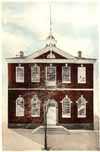
|
|
Congress met in "Congress Hall" from 1790-1799 First 10 amendments, the "Bill of Rights," were added here. |
Philadelphia was the center of the nation from the time of the First Continental Congress (1775) until the nation's capital was moved to the District of Columbia in 1800. For thirteen of those years (from 1775 until the 1788 inauguration of George Washington as the first President under the Constitution) our governing concept was that of a confederation of sovereign states. The framework of our rules was a little vague at the beginning of that period, eventually becoming explicit when the Articles of Confederation were finally ratified in 1781. Until that rather late moment in the eight-year war, the thirteen rebel colonies governed themselves in a manner similar to thirteen nomadic tribes. Later on, when the Constitution was agreed to in 1787, there was another period of ambiguity until the newer rules actually began to apply. Speaking loosely, for thirteen years the country operated according to the Articles of Confederation. For another twelve years, the United States were absorbed in the task of transition from the Articles to the Constitution of a unified nation.
More discrete episodes in the development of the American Constitution start with the long formative period of English law stretching back to the Magna Charta, with a general trend toward greater authority for individual barons and nobles, and later even to the common English peasant. The Magna Carta began the slow evolution toward the Rule of Law, simply stated as making the king obey his own laws. By the reign of Queen Elizabeth I, the legal profession had evolved considerable sophistication, tending in the direction of the Judges handling the law and the King leading the armed forces, and the Catholic Church supplying many of the rules of everyday conflict. King Henry VIII reduced church control of the courts considerably, but the Anglican church still retained the property and legal authority for decades, slowly giving ground to a King who appointed the Archbishop of Canterbury, who controlled the rest of the church. By the time of the first Queen Elizabeth, the legal profession was headed by the Lord Chancellor, who at that time was Sir Francis Bacon. Somehow, word of Galileo's scientific method traveled to London, and Bacon is credited with converting English Law to English Common Law, essentially grafting the scientific method onto the court system. The system was one of observing what happened and developing a theory about why it turned out that way. Experiments were then applied to test the theory, resulting in the modification of the theory. Decisions were standardized for common forms of dispute, and punishments were varied, with varied outcomes. When the courts were satisfied with a uniform result, the situation was then reduced to codified standard laws, and experimental testing was lessened. Common Law gradually emerged and slowly gathered public respect as a sensible guide to running the country. At that point, judges and kings discovered they had less latitude for capricious or ill-founded decisions; the Rule of Law grew stronger.
By the time of the American Revolution, a number of colonies had developed their own charters and rules, and many customs like the right to a jury trial became accepted rules of society. Many such similarities between colonial rules and the final Constitution have been noticed, and it is traditional to give credit to some of them as having "originated" the later Constitutional provisions. Some of this is strictly factual, some of it may only be conjectural; it probably doesn't seriously matter
What Is the Purpose of a National Constitution?

|
| 13th Century Magna Carta |
NATIONAL constitutions are mainly an outgrowth of the 18th Century Enlightenment, even though similar features are to be found among ancient legal codes. Those who trace the origins of the American constitution to the 13th Century Magna Carta will usually point to a central sentence of clause 39:
No free man shall be arrested, or imprisoned, or deprived of his property, or outlawed, or exiled, or in any way destroyed, nor shall we go against him or send against him, unless by legal judgement of his peers, or by the law of the land.
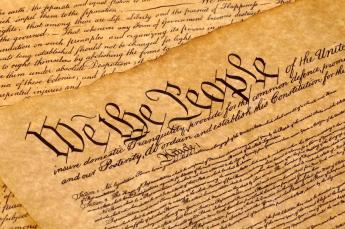
|
| American Constitution |
That's a pretty good beginning, a good example of a needed legal principle, but unrecognizable as what we would today call a Constitution. It states what a government may not do, but does not define the nature of a government which does the job best. Nor do even the many Enlightenment philosophers of government take that final step of outlining where their notions should take us until the American Constitution had been written and defended in the Federalist papers. Nowhere among the writings of Montesquieu (The Spirit of the Laws, 1748), Catherine the Great (Nakaz, Instructions to the All-Russian Legislative Commission, 1767), Diderot (Observations About Nakaz, 1774), James Madison (1787), John Dickinson(1763) or Gouverneur Morris(1787) can there be found much tightly described definition of a constitution. Certainly, there is no definition within the writings of Adam Smith if we look for rule-making among Enlightenment thinkers whose ideas were influential on the 1787 Philadelphia document. The American constitution was the product of many minds, before and after 1787. The outlines of its final form converged, and emerged, from the Constitutional Convention of the summer of 1787, with Gouverneur Morris as the penman of record. To him, we certainly owe its succinctness, which is the main source of affection for the document. That probably understates matters; in his diary of the secret meetings, James Madison records that Gouverneur Morris rose to speak about 170 times, more than any other delegate. Lots of thought and debate; ultimately, few words.
The Elizabethan Sir Francis Bacon has the greatest claim on devising a theory of law and law-making in the Anglosphere tradition. But his elegant modification of Galileo's scientific method, the English Common Law, is more a methodology for creating good laws than an outline of a nation's legal principles. Anyway, tracing the American Constitution back to an underlying British one tends to stumble when the British Constitution fails to meet a definition which would include our own. The British Constitution is said to be "unwritten" to the degree it is a consensus of revered documents. It can be amended by Parliament at will, has a variable history of defining just who is covered by it, and in order to define constitutional principles seems to rely on sentences extracted from difficult context. If the two constitutions had been written and compared at the same time, one would say the British had sacrificed coherence out of respect for tradition. In fairness, some features of the American constitution are also perhaps unnecessary for every constitution, but by surviving as the oldest constitution of the modern form, have become its model. That would be:
A set of principles governing the legitimacy of a nation's laws, and firmly standing above them. It defines its own domain, geographically and by the membership of a defined citizenry. Except as otherwise defined, it supersedes all other governance within its domain. It defines and defends its own origins. It includes a description of how to amend it, which is intentionally infrequent and difficult. It goes on to outline the structure of the laws it regulates, with subtle modifications made to channel the type of power structure which will govern.
In the American case, history and culture generated several other instabilities so central they justified heightening the difficulty to amend them to a Constitutional level, thus conferring undisputed dominance over competing principles of governance. That would be:
A separation of government powers weakened all potentially offending branches of government, and thus enhanced citizen liberty. Separation of church from state, for like purpose. A right of citizens to bear arms, to strengthen citizens' defense against internal or external attack, and perhaps also warning that revolt must be possible, even endorsed, as some final extremity of protection for citizen sovereignty.
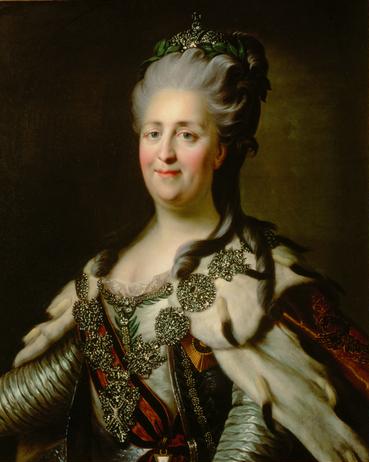
|
| Russia's Catherine the Great |
It enhances our comprehension to contrast the outcomes of competing 18th Century implementations of the Constitution idea. Russia's Catherine the Great proposed a constitution steeped in the traditions of the Enlightenment but ultimately designed to define and strengthen the role of the monarch. Denis Diderot her French protege recoiled at this viewpoint, substituting other views resembling those of Jean Jacob Rousseau. He opened Observations About Nakaz his commentary to the Queen, with the following declaration:
There is no true sovereign except the nation; there can be no true legislator except the people. Whether looking back to the English Civil War or forward to future disputes between the Executive and Legislative branches, it makes clear the Legislative branch was dominant, with the Executive branch acting as its agent.
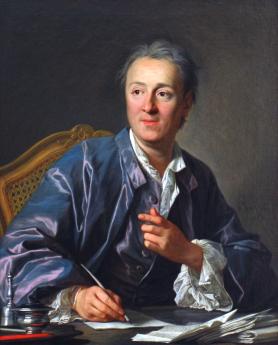
|
| Denis Diderot |
With this ringing warcry, the French model nevertheless ushered in the extremes of the Terror, the Guillotine, and the Napoleonic conquests. The consequences of the French constitution undermined world confidence in the benevolence of public opinion, at least deeply confounding those for whom the democratic rule was not totally discredited. Once more new life was breathed into allegiance for the monarchy, military rule, and dictatorship. Public opinion, it seemed, was not either invariably benign or comfortably far-seeing. The noble savage, mankind naked of tainted civilization, was not necessarily wise or worthy of trust. Edward Gibbons, the 1776 author of The Decline and Fall of the Roman Empire was pointing out where it all might lead if we completely believed in the collective goodness of the human condition. At the least, the failure of the French Revolution complimented the viewpoint of the Scottish philosopher, Adam Smith, who also in 1776 emphatically urged a switch in that reliance toward a sense of enlightened self-interest, as follows:
It is not from the benevolence of the butcher, the brewer, or the baker, that we can expect our dinner but from their regard to their own interest.
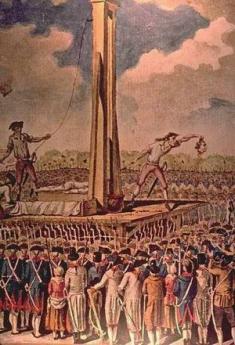
|
| Terror, the Guillotine, |
It is not surprising that Diderot rejected the Leibniz view of things that "All is for the best, in this best of all possible worlds." And, in view of his dependence on Catherine, not surprising he did not publish his rejection of it until 1823. Thomas Jefferson was in France as ambassador during the time of the American Constitutional Convention, fearing to confront George Washington; and likewise keeping his conflicting views private for several years. Eventually, they surfaced in the creation of an anti-Federalist political party along with the conflicts which kept the new nation in a turmoil for the following forty years. It is surely a testimony to the strength of the Constitution's design that the country was able to shift between such extreme governing philosophies but still hold together without changing the governing statement of purpose. Indeed, it is plausible to contend that our two political parties still continuously debate the useful tension between these two differing opinions.
George Washington on the Federal Union
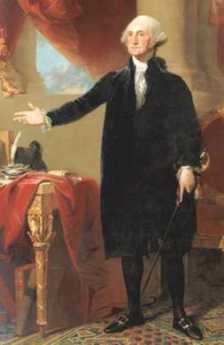
|
| President George Washington |
"It is of infinite moment that you should properly estimate the immense value of your national union to your collective and individual happiness; that you should cherish a cordial, habitual and immovable attachment to it; accustoming yourselves to think and speak of it as of the palladium of your political safety and prosperity, watching for its preservation with jealous anxiety; discountenancing whatever may suggest even a suspicion that it can, in any event, be abandoned; and indignantly frowning upon the first dawning of any attempt to alienate any portion of our country from the rest, or to enfeeble the sacred ties which now link together the various parts."
Relocation

|
| Moving Truck |
For many decades, at least since the Second World War, the Northeastern part of the country has been losing population. And business, and wealth. In recent years, New Jersey has been the state with the greatest net loss, and the Governor who is making the greatest fuss about it. Statisticians have raised this observation to the level of proven fact, although lots of people are even moving into New Jersey at the same time. This is a net figure, and it remains debatable what sort of person you would want to gain, hate to lose; so it's hard for politicians to be certain whether New Jersey's demographic shifts are currently a good thing or a bad thing.
Take the prison population, for example. Most people in New Jersey would think it was a good thing if the felons all moved to some other state because it would imply less crime and law enforcement costs. But one of the major recent causes of a decline in violent crime seems to be the universal presence of a portable telephone in everyone's pocket. Just let someone yell, "Stick 'em up!" loud enough, and thirty cell phones are apt to emerge, all dialing 911. On the other hand, cell phones are the universal communication vehicle for sales of illicit drugs and other illegal recreations, and the increase in automobile accidents is a serious business for inattentive drivers. Add to this confusion the data that capital punishment is more expensive for the State than incarceration is, and you start to see the near futility of knowing what is best to have more, or less, of.
What the Governor and his Department of Treasury mostly want to know is whether certain taxes end up producing a good net revenue for the State. That is, whether more revenue is produced by raising certain taxes more than others, or whether some taxes are a big component of the Laffer Curve, causing revenue to be lost by driving business, or business owners, out of state, in spite of the immediate revenue gain. The studies which have been done are fairly conclusive that executives tend to be most outraged by property taxes, since they have a hidden effect on the sale price of the house, and the amount of money available for school improvements. At least at present levels, a Governor is better off taking abuse for raising income or sales taxes, even though the apparent tax revenue might be the same as a rise in property taxes. Since property taxes are mostly set by a local municipal government, while sales and income taxes are usually set by state governments, a decision to raise one sort of tax or another can have unexpected consequences, or require obscure manipulations to accomplish.
Some politicians who believe their voting strength does not lie in the middle class, would normally want to hold up property values, not taxes because the data show that higher home prices drive away from the middle class and in certain circumstances are positively attractive to wealthy ones. Higher prices appeal to home sellers, at least up to a point. Wealthier people who are buying houses are likely to have an old one to sell; that's less true of first-time home buyers or people presently renting. Certain issues can even be reduced to rough formulas: a 1% increase in income tax would cause a 1% loss of population, but a 5% loss of people earning more than $125,000. A $10,000 increase in average home prices, on the other hand, causes a net loss of population, but mostly those with lower income. One important feature of tinkering with average home prices and property taxes is that these effects are "durable" -- they do not fade away over time.
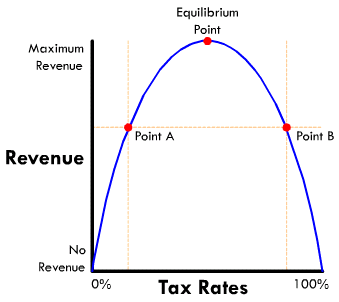
|
| Laffer Curve |
New Jersey is financially a bad state to die in, but the decision to move to Delaware, Florida or Texas is often made over a long period of years in advance of actually doing it. It has been hard to compile statistics relating changes in inheritance tax law to net migration of retirees and to present such dry data in an effective manner to counteract the grumblings that rich people are undeserving of tax relief, or dead people are unable to complain. But rich old folks are very likely to own or control businesses, and if you drive them out of state, you may drive away a considerably larger amount of taxation relating to the business in other ways. This is the underlying complaint of Unions about Jobs, Jobs, Jobs; but state revenue also relates to sales taxes of the business, business taxes, employee taxes, real estate taxes on the business property, etc, etc. Sometimes these effects are more noticeable in the region they affect; the huge population growth of the Lehigh Valley in recent years is mainly composed of former New Jersey suburbanites, who formerly earned their income in New York. The taxes of three different states interact, in places like that.
The audience of a group I recently attended contained a great many people who make a living trying to persuade businesses to move into one of the three Quaker states of the Delaware Valley. The side-bar badinage of these people tended to agree that many of the decisions to relocate a business are based on seemingly capricious thinking. The decision to consider relocation to the Delaware Valley is often prompted by such things as the wife of an executive having gone to school on the Main Line. Following that, the professional persuaders move in with data about tax rates, average home prices, and the ranking of local school quality by analysts. Having compiled a short list of places to consider by this process, it all seemingly comes back to the same capriciousness. The wife of the C.E.O. had a roommate at college who still lives in the area. And she says the Philadelphia Flower Show is the best there is. So, fourteen thousand employees soon get a letter, telling them we are going to move.
And, the poor Governor is left out of the real decision-making entirely, except to the degree he recognizes that home property taxes have the largest provable effect on personal relocation. And lowering the corporate income tax has the biggest demonstrable effect on moving businesses. But the largest un-provable effect is dependent on the comparative level of the state's inheritance tax.
Sanctity of Contracts
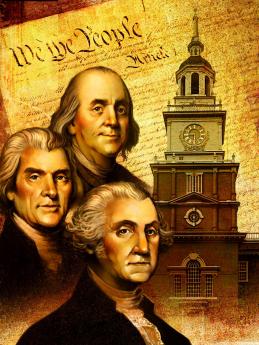
|
| Constitution |
THERE is little doubt many state legislatures behaved in a capricious and high-handed way in the twenty years prior to the 1787 Constitution. Outrage at this behavior was one of the important stimulants to writing the Constitution, as well as putting public pressure on state legislatures to ratify it in 1788. Section 10 of Article 1 is devoted to limitations on state behavior deemed to be generally offensive or otherwise contrary to the national interest. Among the comparatively short list of absolute prohibitions is found "No state shall......, pass any law.....impairing the obligation of contracts, or grant any title of nobility." This section condemns certain behavior as indefensible but does not specify the Federal government to be similarly limited, along with the states. However, the government which was established as one of the limited federal powers. Unless a power was specifically granted to the Federal government, the Tenth Amendment announces it belongs to the states, or, as the Ninth Amendment would have it, to the people. There seemed no need to limit the scope of a power which could not exist. The Tenth and final Amendment in the Bill of Rights ended the 1791 Constitution with the words:
X. The powers not delegated to the United States by the Constitution, nor prohibited by it to the states, are reserved to the States respectively, or to the people.
A modern capsulation might be: the Federal Government is no more empowered to impair the sanctity of contracts than it is to grant titles of nobility.
The Framers of the Constitution were inexperienced in the habits of a republic, or they might have anticipated the general tendency of those who are empowered to enforce the law, to flout it in their own behavior. Around the smallest courthouse in the nation, one need not be surprised to find the Sheriff or other local worthies, parking their cars in illegal spots without fear of punishment. It is not just state legislatures who are tempted to disobey the laws they pass, but a general tendency of all authority to do so. It requires a local citizenry with a very short fuse, displaying instant hostility to the first sign of this sort of swaggering, to keep their local newspapers from filling up with scandal stories in the weeks before an election. Many of these stories are politically motivated, of course, but it must be admitted that in a naughty world, they are necessary.
 No State shall enter into any Treaty, Alliance, or Confederation; grant Letters of Marque and Reprisal; coin Money; emit Bills of Credit; make any Thing but gold and silver Coin a Tender in Payment of Debts; pass any Bill of Attainder, ex post facto Law, or Law impairing the Obligation of Contracts, or grant any Title of Nobility. No State shall, without the Consent of the Congress, lay any Imposts or Duties on Imports or Exports, except what may be absolutely necessary for executing it's inspection Laws: and the net Produce of all Duties and Imposts, laid by any State on Imports or Exports, shall be for the Use of the Treasury of the United States; and all such Laws shall be subject to the Revision and Control of the Congress. No State shall, without the Consent of Congress, lay any duty of Tonnage, keep Troops, or Ships of War in time of Peace, enter into any Agreement or Compact with another State, or with a foreign Power, or engage in War, unless actually invaded, or in such imminent Danger as will not admit of delay. 
|
| Article One, Section 10 |
A 21st Century illustration is found in a letter sent to current beneficiaries of Social Security, reducing their monthly check by twenty or more percent in some cases, and in other cases just a few dollars. The notice says that this deduction is based on IRS reports of the individual's income, using material supplied by the Internal Revenue Service, thereby triggering an additional side question about the right of the government to use supposedly private information to impair the obligation of the Social Security contract. Setting the privacy issue aside, what is illustrated is an even more discouraging violation of the expectations for fair dealing. This is a privacy right which might have been enforced by an excruciating repetition of the time-consuming requirement of manual specification. Now that computers are more common, what formerly needed no specification, now perhaps begins to need it, since endless repetition is now so tediously conventional.
Governments casually violate the sanctity of contracts when it is self-serving to do so, and presumably, it can be shown that they neglect to violate, or even punish those who violate, whenever such violations are to the advantage of anyone else. It has been said that this matter has been adjudicated in favor of the government in the past, thus creating a precedent, stare decisis, so to speak. Whatever the logic of such precedents, growing Constitutional literacy among the public is going to demand that the matter be re-argued. That is to say, it is comparatively easy to imagine growing knowledge about the Constitution among the citizens, while it will never be easy to expect the public to puzzle through the steps in a judicial chain which explicates how the reverse is now a superior view. Therefore, the demand for re-argument should be a growing one.
George Mason and Triumvirates
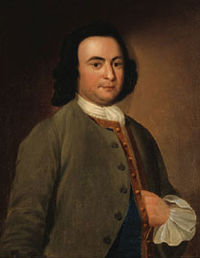
|
| George Mason |
George Mason was George Washington's neighbor in Virginia, a good friend, and an important contributor to the Constitutional Convention, once he got there. There was every reason to think he would be an enthusiastic supporter of the document, but at the end of the Convention, he refused to sign it. Various explanations for his behavior have been offered, but one that might be considered is that he offered a proposal to have the President be replaced by three people, one from the North, one from the South, and one to be drawn from the middle colonies. He was pretty passionate about his idea for a triumvirate, so passionate it rises to the level of a possible explanation for his refusing to sign.
We have not yet been able to define the Power of the Executive; and however moderately some Gentlemen may talk or think upon the subject, I believe there is a general Tendency to a strong Executive and I am inclined to think a strong Executive necessary. If Strong and extensive Power is vested in the Executive, and that Executive consists only of the one Person, the Government will of course degenerate, (for I will call it degeneracy) into a Monarchy-- A Government sop contrary to the Genius of the People, that they will reject even the Appearance of it. I consider the Federal Government as in some Measure dissolved by the Meeting of this Convention. Are there no Dangers to be apprehended from procrastinating the time between the breaking up of this Assembly and the adoption of a new System of Government. I dread the Interval. If it should not be brought to an issue in the Course of the first Year, the Consequences may be fatal. Has not the different Parts of this extensive Government, the several States of which it is composed a Right to expect an equal Participation in the Executive, as the best Means of securing an equal Attention to their Interests. Should an Insurrection, a Rebellion or Invasion happen in New Hampshire naturally ascribe any Delay in defending them to such a Circumstance and so vice versa. If the Executive is vested in three Persons, one chosen from the Northern, one from the middle, and one from the Southern States, will it not contribute to quiet the Minds of the People, and convince them that there will be proper attention paid to their respective Concerns? Will, not three Men so chosen bring with them, into Office, a more perfect and extensive Knowledge of the real Interests of this great Union? Will not such a Model of Appointment be the most effectual means of preventing Cabals and Intrigues between the Legislature and the Candidates for this Office, especially with those Candidates who from their local Situation, near the seat of the Federal Government, will have the greatest Temptations and the greatest Opportunities. Will it not be the most effectual Means of checking and counteracting the aspiring Views of dangerous and ambitious Men, and consequently the best Security for the Stability and Duration of our Government upon the invaluable Principles of Liberty? These Sir, are some of my Motives for preferring an Executive Consisting of three Persons rather than one
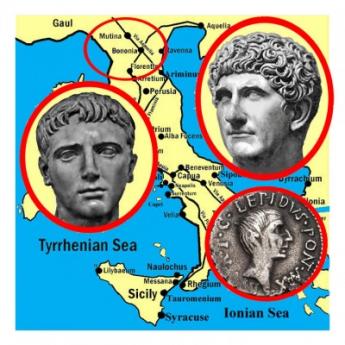
|
| Marc Antony, Lepidus, and Octavius Caesar |
The Constitutional Convention has been described as being strongly influenced by the Senate of ancient Rome, and Shakespeare's depiction of it was very popular in the colonies. It, therefore, seems strange that Mason would be so strongly attracted to a form of government which attended the dissolution of the Roman Senate, and the long reign of Emperors which followed it. The first triumvirate lasted only five years and consisted of Julius Caesar, Pompey, and Crassus. With Caesar's move toward the throne, this particular triumvirate did not come out to what would have been the American colonist wishes. The second triumvirate also only lasted five years, consisting of Marc Antony, Lepidus, and Octavius Caesar. Shakespeare tells us in no uncertain terms that did not work out. In both cases, two of the three went to war with each other but first disposed jointly of the third. Mason does not mention the Roman examples, perhaps because they posed inconvenient outcomes. Perhaps this tobacco farmer was not sufficiently learned about Rome, but it is also possible that he was thinking of the three centuries of Roman history where there was a succession of Emperors, mostly bad ones. During that period, Rome was really ruled by many triumvirates with subordinate absolute powers, specifically denominated. Essentially this was an organized aristocracy and it supposedly worked pretty well. And perhaps George Mason just secretly disliked Washington or feared tendencies he was close enough to know about. Or maybe six other things. We certainly can be sure the rest of the convention knew some Roman history, and definitely did not want to see either a King or an Aristocracy. No matter how gentle and persuasive, one of their esteemed colleagues might be about it.
Appealing the Constitution to a Higher Authority
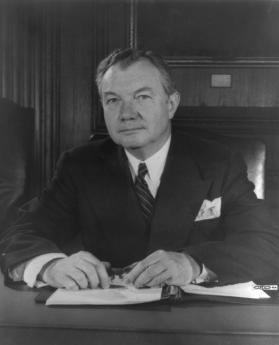
|
| Justice Robert H. Jackson |
According to Justice Robert H. Jackson, "We" (The Supreme Court) "are not final because we are infallible, we are infallible because we are final." Scoop Jackson was the last Justice who never went to college or graduated from Law School, so his viewpoint concentrated on the practical outcome of a situation. In fact, the father of our constitution, James Madison, was learned in the history of many constitutions, and was well aware of allusions to divinity in the construction of our governing document, particularly when the sources of strong beliefs couldn't be grounded in evidence. However,the Age of Enlightenment was highly religious, so they gave credit to divine guidance when they really were imitating the Legal profession.The lawyer's system of progressive appeal to a hgher court of appeals was a very clever adaptation of recognition that most problems are pretty simple andcan be handled without much training.The Constitution is an attempt to reconcile our culture to the needs of government and the revelations of controversy. Composed by Enlightenment rationalists within a highly religious environment, the Founding Fathers were careful to use the metaphors of Religion, even though many were personally skeptics about the substance. Indeed, the Penman of the Constitution who ultimately wrote most of the words was Gouverneur Morris, a flagrant libertine. It had been the tradition of Constitutions to describe their culture by allusion to epic poems, drawing inferences about Right and Wrong from what had subsequently happened to ancient heroes after similar situations unfolded. Some would put the plays of Shakspere in that role in 1787, but the evidence is stronger for Roman writers, like Cato and Cicero. In my own view, this leap of faith was only divine in the sense it was a one-way street. A citizen might try to emulate the ancients, but appealing back to them was not likely to work.
Although the Constitution can be viewed as bridging a gap between Culture and Common Law, or perhaps as placing a guardhouse between them, this relationship is not spelled out and therefore, in theory, might be changed. Other cultures, perhaps the native Indian, or the Catholic Church of Central Europe, might be substituted, or other legal structures resembling the Napoleonic Code might serve on the opposite side of the bridge. These substitutions were a legal possibility, but there is little doubt the American leadership intended for an Anglo-Saxon culture, linked with Francis Bacon's legal system, to prevail under a distinctively American flag. Because of our debt to France for then-recent assistance, there was once the possibility of French coloration to our culture, but the excesses of the French Revolution soon ruled that out. Some modern observers have capsulized the scene: First, we got the British to help throw out the French in 1754; and then in 1776, we got the French to help us throw the British out. Both our allies thought we played their game, but we were playing our own. The new Constitution specified no laws, but with little doubt the Framers intended the states to adopt British Common Law without the infelicity of saying so.
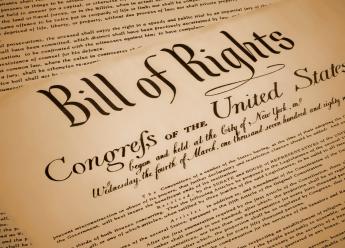
|
| Bill of Rights |
And then there is the Bill of Rights. Madison had great faith in the ability of structure (separation of powers, term limits, etc.) to command predictable outcomes, and initially resisted any need for a Bill of Rights. But the Ratification Conventions in the states showed him the need to yield. The First Congress soon enough confronted over a hundred proposed rights in petitions from the states, especially the four big ones. If anyone else had been in Madison's position, our Bill of Rights would resemble the European one today, fifty pages long and growing. That outcome would have greatly weakened the Legislative branch since after protests about Mother Nature subside, the legal fact emerges that Rights are merely laws which no majority can overturn. They might even be characterized as a contrivance for transient majorities to promote the permanence of their viewpoint.

|
| The Founding Fathers |
But they are not the only contrivance in politics. Enshrinement of the Founding Fathers elevated their political positions into near divinity, whereas debunking the Founders personally undermines their symbolism as statues and myths. There was too much of this during the romance period of the Nineteenth century, but also in von Ranke's later marginalization of History into mere scholarship and footnotes, which was a reaction to it. The Founding Fathers themselves now supplant Achilles and Cincinnatus in our lexicon, and we have little choice but to accord more weight to their original intent in the Constitution, than to contemporary reasonings. Indeed, we are forced to acknowledge more similarity between George Washington's fictitious cherry tree than to his relations with Peggy Fairfax, when we interpret his thundering "Honesty is the best policy" in the second inaugural address. It is admittedly a difficult choice, but Justices now need to consider what his audience widely believed was his original intent, more than what later archeological discoveries uncover. Justice Scalia is correct in placing more weight on the original intent of the Founding Fathers than contemporary reactions to the same words. But in occasional conflicts between myth and reality, it seems safer to consider what the audience then widely believed, than what modern audiences would guess at.
Jury Nullification
 |
| Tom Monteverde |
We must be grateful to the late distinguished litigator, Tom Monteverde, for reminding us of the importance of the jury in American history. Juries seldom realize how much power they can have if they unite on a common purpose. In fact, juries have the implicit right to veto almost anything the rest of government does, by rendering it unenforceable. If the jury opinion is a majority view, nothing but a civil war can legally stop them. So it helped Washington to have jury nullification seem an invincible Quaker idea, while the South trusted a rich slave-owner who had renounced power.
 |
| William Penn |
The right to a jury trial originated in the Magna Carta in 1215, but a jury's essentially unlimited power was established four centuries later by Quakers. The legal revolution grew out of the 1670 Hay-market case, where the defendant was William Penn, himself. Penn was accused of the awesome crime of preaching Quakerism to an unlawful assembly, and while he freely admitted his guilt he challenged the righteousness of such a law. The jury refused to convict him. The judge thus faced a defendant who said he was guilty and a jury who said he wasn't. So, the exasperated judge responded -- by putting the jury in jail without food.
The juror Edward Bushell appealed to the Court of Common Pleas, where the problem took on a new dimension. The Justices certainly didn't want juries flouting the law, but nevertheless couldn't condone a jury being punished for its verdict. Chief Justice Vaughn decided that intimidating a jury was worse than extending its powers, so the verdict of Not Guilty was upheld, and Penn was set free. Essentially, Vaughn agreed that any jury that wasn't allowed to acquit was not really a jury. In this way, the legal principle of Jury Nullification of a Law was created. A verdict of not guilty couldn't make William Penn innocent, because he pleaded guilty. A verdict of not guilty, under these circumstances, meant the law had been rejected. Jury nullification thus got to be part of English Common Law, hence ultimately part of the American judicial system.
 |
| Andrew Hamilton |
This piece of common law was a pointed restatement of just who was entitled to make laws in a nation, whether or not nominally it was ruled by a king or a congress. Repeated British evasion of the principles of jury trial became an important reason the American colonists eventually went to war for independence, and probably a better one than some others. The 1735 trial of Peter Zenger was an instance where Andrew Hamilton, the original "Philadelphia Lawyer", convinced a jury that British law, blocking newspapers from criticizing public officials for improper conduct, was too outrageous to deserve enforcement in their court. In that case, jury defiance became even more likely when the judge instructed the annoyed jury that "the truth is no defense". Benjamin Franklin's Pennsylvania Gazette was here quick to come to the side of jury nullification, saying, "If it is not the law, it ought to be law, and will always be law wherever justice prevails." Franklin quickly became allied with Andrew Hamilton, who became Speaker of the Pennsylvania Assembly.
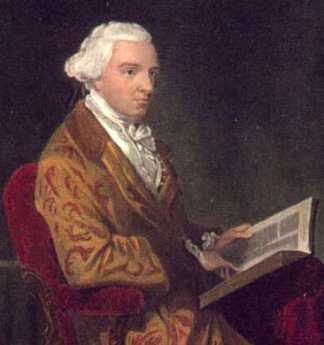 |
| John Hancock |
The Zenger case was often stated to be the origin of the Freedom of the Press in our Constitution fifty years later, but in fact the First Amendment merely provides that Congress shall pass no laws like that. Hamilton had persuaded the Zenger jury they already had the power to stop enforcement of such tyranny, and the First Amendment could be seen as trying to prevent enactment of laws that will foreseeably incite a jury to revolt.
The Navigation Acts of the British government, for example, were predictably offensive to the American colonists, whose randomly chosen representatives on juries were then rendered useless with their wide-spread refusal to convict. This, in turn, provoked the British ministry. John Adams made a particularly famous defense of John Hancock who was being punished with confiscation of his ship and a fine of triple the cargo's value. Adams was later singled out as the only named American rebel the British refused to exempt from hanging if they caught him. As everyone knows, Hancock was the first to step up and sign the Declaration of Independence, because by 1776 there was widespread colonial outrage over the British strategy of transferring cases to the (non-jury) Admiralty Court. Many colonists who privately regarded Hancock as a smuggler were roused to rebellion by the British government thus denying a defendant his right to a jury trial, especially by a jury almost certain not to convict him. To taxation without representation was added the obscenity of enforcement without due process. John Jay, the first Chief Justice of the Supreme Court of the newly created United States, ruled in 1794 that "The Jury has the right to determine the law as well as the facts." And Thomas Jefferson built a whole political party on the right of common people to overturn their government, somewhat softening, it is true, when he grasped where the French Revolution was heading. Jury Nullification then lay fairly dormant for fifty years. But since the founding of the Republic and the reputation of many of the most prominent founders was based on it, there was scarcely need for any emphasis.
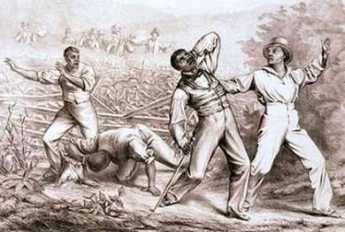 |
| Slave |
And then, the Fugitive Slave Law of 1850 began to sink in. It became evident that juries in the Northern states would routinely refuse to convict anyone under that law, or under the Dred Scott decision, or any other similar mandate of any branch of government. In effect, Northern juries threw down the gauntlet that if you wanted to preserve the right of trial by jury, you had better stop prosecuting those who flouted the Fugitive Slave law. In even broader terms, if you want to preserve a national government, you had better be cautious about strong-arming any impassioned local consensus. A rough translation of that in detail was that no filibuster, no log-rolling, no compromises, no oratory, no threats or other maneuvers in Congress were going to compel Northern juries to enforce slavery within their boundaries of control. All statutes lose some of their majesties when the congressional voting process is intensely examined, and public scrutiny of this law's passage had been particularly searching. Even if Southern congressmen would be successful in passing such laws, it wasn't going to have any effect around here. The leaders of Southern states quickly got a related message, and their own translation of it was, "We have got to declare our independence from this system of government that won't enforce its own laws". If juries can nullify, then states can nullify, and the national union was coming to an end. Both sides disagreed so strongly on this one issue they were willing, for the second time, to risk war for it.
Ku Klux Klan
The idea should be resisted that Jury Nullification is always a good thing. After the Civil War, many of the activities of the Ku Klux Klan were tolerated by sympathetic juries. Many lynch mobs of the Wild, Wild West were encouraged in the name of law and order. Prohibition of alcohol by the Volstead Act was imposed on one part of society by another, and Jury Nullification effectively endorsed rum-running, racketeering, and organized crime. The use of marijuana and abortion are two further examples where disagreement is so strong that compromise eludes us. What is at stake here is protecting the rights of a minority, within a society run by a majority. If minority belief is strong enough, jury nullification issues an unmistakable proclamation: "To proceed farther, means War."
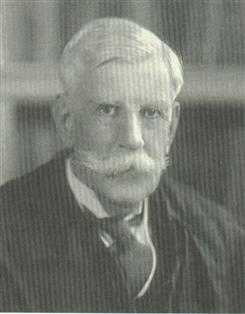 |
| Oliver Wendell Holmes |
That's a somewhat strange outcome for a process started by pacifist Quakers, so the search goes on for a better idea. Distinguished jurists differ on whether to leave things as they are. In a famous exchange, Oliver Wendell Holmes once had dinner with Judge Learned Hand, who on parting extended a lawyer jocularity, "Do justice, Sir, do justice." To which, Holmes then made the somewhat surly response, "That is not my job. My job is to apply the law."
Thus lacking any better approach, it is hard to blame the US Supreme Court for deciding this was something best left unmentioned any more than absolutely necessary. The signal which Justice Harlan gave in the majority opinion on the 1895 Sparf case was the very narrow ruling that a case may not be appealed, solely on the basis that the trial jury was not informed of its right to nullify the law in question. Encouraged by this vague hint, what has evolved has been a growing requirement that incoming jurors take an oath "to uphold the law", officers of the court (ie lawyers)are discouraged from informing a jury of its true power to nullify laws, and Judges are required to inform the jury in their charge that they are to "take the law as the judge lays it down" (ie leave appeals to higher courts). If a jury feels so strongly that it then persists in spite of those restraints, well, you apparently can't stop them. Nobody thinks this is a perfect solution, and aggrieved defendants like the Vietnam War protesters are quite vocal in their belief that the U.S. Supreme Court finally emerged with a visibly asinine principle: a jury does indeed have the right to nullify, but only as long as that jury is unaware it has that right. That's almost an open invitation to perjury if accurate; but while it's not precisely accurate, it comes close to being substantially true.
That's where matters stand, and apparently will stand, until someone finds better arguments than those of Benjamin Franklin, John Jay, Andrew Hamilton -- and William Penn.
| Posted by: G4 | Jul 2, 2012 5:06 PM |
| Posted by: LOUIS PAIZ | Oct 1, 2009 11:30 AM |
31 Blogs
Washington Picks out Madison
Washington and Madison collaborated closely in promoting a Constitutional Convention. Who enlisted whom into this adventure?
Designing the Convention
 To understand the original intent of the Constitution, it helps to see it in three parts. The part Washington and Madison devised in 1787 was mostly about structure, the main goal of which was to lay out certain national functions which the federal government could perform without state interference. That's delicate diplomacy because the states had to ratify it.
To understand the original intent of the Constitution, it helps to see it in three parts. The part Washington and Madison devised in 1787 was mostly about structure, the main goal of which was to lay out certain national functions which the federal government could perform without state interference. That's delicate diplomacy because the states had to ratify it.
IF ALL MEN WERE ANGELS, NO CONSTITUTION WOULD BE NECESSARY
 A lot of shrewd thinking went into the checks and balances of the Constitution, some of it in quaint language.
A lot of shrewd thinking went into the checks and balances of the Constitution, some of it in quaint language.
Go to Delaware, Elephants?
 It's about a 20-minute commute from Delaware to Philadelphia, with a big difference in estate taxes. Moving from New Jersey to Delaware would double that difference.
It's about a 20-minute commute from Delaware to Philadelphia, with a big difference in estate taxes. Moving from New Jersey to Delaware would double that difference.
Reversing Madison's Scheme
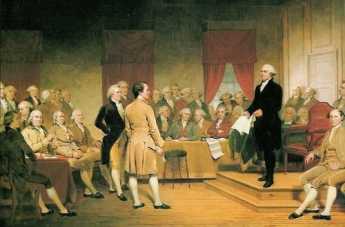 Reversing the technique to attract rich people, might drive away poor ones. If that's what you want to do.
Reversing the technique to attract rich people, might drive away poor ones. If that's what you want to do.
ARCHITECTURE OF GOVERNMENT: (1) ARTICLES OF STRUCTURE
There wasn't much to the Articles of Confederation. The document was more an oath of perpetual allegiance among thirteen tribes who had been attacked by a common enemy. Someone had to have the stature to proclaim it was silly to declare such an arrangement to be perpetual.
Articles of Confederation: Flaws
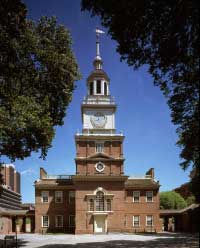 Some subtle features make the Constitution a vast improvement over the Articles of Confederation.
Some subtle features make the Constitution a vast improvement over the Articles of Confederation.
Concessions and Agreements
 Most 17th Century colonies were proprietorships, requiring agreements for local autonomy without losing allegiance to the home country. William Penn cleverly expanded the New Jersey document into the intellectual precursor of the U.S. Constitution.
Most 17th Century colonies were proprietorships, requiring agreements for local autonomy without losing allegiance to the home country. William Penn cleverly expanded the New Jersey document into the intellectual precursor of the U.S. Constitution.
Legislative Branch: Two Chambers or One?
 The Romans, two thousand, and the Icelanders, one thousand years ago, developed parliaments that served as models for our own Congress. They were unicameral, however. Bicameralism had the model of the British Parliamentary system, but the Aristocratic House of Lords is currently being whittled away. The Pennsylvania Constitution of 1777 seems to have been one of the few to recognize how important the distinction is, and shows why two are better than one. The British better go back to the Thirteenth century and start over.
The Romans, two thousand, and the Icelanders, one thousand years ago, developed parliaments that served as models for our own Congress. They were unicameral, however. Bicameralism had the model of the British Parliamentary system, but the Aristocratic House of Lords is currently being whittled away. The Pennsylvania Constitution of 1777 seems to have been one of the few to recognize how important the distinction is, and shows why two are better than one. The British better go back to the Thirteenth century and start over.
ARCHITECTURE OF GOVERNMENT: (2) COMPROMISE BETWEEN BIG AND LITTLE STATES SETS THE TONE
When a set of principles is set before fifty distinguished men of affairs who respect, but most do not know, each other - even they are surprised by what emerges after their experience collides with a simple theory.
Advantages and Disadvantages of Being a Small Country
 Remaining a small country has many merits, but one big demerit. Your neighbors are tempted to swallow you up.
Remaining a small country has many merits, but one big demerit. Your neighbors are tempted to swallow you up.
Political Effects of Increasing Population
 The Founding Fathers worried about the effect on a state's politics, particularly depending on relative size compared with other states. What could we tell them about that, after a few hundred years of experience?
The Founding Fathers worried about the effect on a state's politics, particularly depending on relative size compared with other states. What could we tell them about that, after a few hundred years of experience?
ARCHITECTURE OF GOVERNMENT: (3) SEPARATION AND BALANCE OF POWERS
Separation and balance of powers was probably Madison's idea, but it has been irregularly implemented.
Separation and Balance of Powers
 The authors of the American Constitution made a little distinction between a separation of powers and a balancing of them, which now seem a two-step process. Separate, then rebalance.
The authors of the American Constitution made a little distinction between a separation of powers and a balancing of them, which now seem a two-step process. Separate, then rebalance.
ARCHITECTURE OF GOVERNMENT: (4) MAJORITY RULE
For thousands of years, everybody had a simple understanding of majority rule. It seemed so basic and so simple that some felt it was the voice of God. And then the Constitutional Convention had a second look.
ARCHITECTURE OF GOVERNMENT: (5) UNIFORMITY
The section on Patents and Copyrights is the only clear example in the Constitution, suggesting uniformity is innately a good thing to encourage. It conflicts with absolute liberty, a little, but it discourages needless individualism when that causes needless friction.
Patent Pending
 The provision for patents is part of the Constitution, and seems a little out of place. The motion was made by James Madison and seconded by Thomas Pinckney. But some of us think it sounds more like the work of Ben Franklin.
The provision for patents is part of the Constitution, and seems a little out of place. The motion was made by James Madison and seconded by Thomas Pinckney. But some of us think it sounds more like the work of Ben Franklin.
ARCHITECTURE OF GOVERNMENT: (6) POLITICAL PARTISANSHIP
 Madison proclaimed in Federalist No. 10 that republican government could be designed to eliminate political parties. Unfortunately, he learned better.
Madison proclaimed in Federalist No. 10 that republican government could be designed to eliminate political parties. Unfortunately, he learned better.
Political Parties, Absent and Unmentionable
 Our Constitution is much praised for exquisitely balancing power between the three branches of government. It would even be an achievement to require two centuries to find a way to unbalance them.
Our Constitution is much praised for exquisitely balancing power between the three branches of government. It would even be an achievement to require two centuries to find a way to unbalance them.
Joseph Story on Politics Under the Constitution
 Joseph Story, Justice of the U.S. Supreme Court during the time of Chief Justice Marshall, had something to say about political parties.
Joseph Story, Justice of the U.S. Supreme Court during the time of Chief Justice Marshall, had something to say about political parties.
Government Features Under Stress
 A major strength of the U.S. Constitution is that it comfortably adjusted to consequences it had not foreseen. Equally important is its ability to encompass developments no one could have foreseen.
A major strength of the U.S. Constitution is that it comfortably adjusted to consequences it had not foreseen. Equally important is its ability to encompass developments no one could have foreseen.
Three Revolutions at Once, Maybe Four
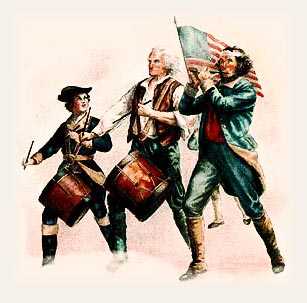 Asking the cause of the American Revolutionary War may be a little simplistic; civil wars pop up, all over the place, all the time. The more important question to ask, is why did this American Revolution have such a dramatic effect on the whole world?
Asking the cause of the American Revolutionary War may be a little simplistic; civil wars pop up, all over the place, all the time. The more important question to ask, is why did this American Revolution have such a dramatic effect on the whole world?
How Could We Improve State Legislatures?
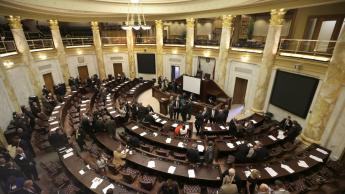 If state legislatures are as bad as their reputation, we ought to be asking questions. Like, how did they get that reputation, and what can improve it?
If state legislatures are as bad as their reputation, we ought to be asking questions. Like, how did they get that reputation, and what can improve it?
Twenty Five Years at the Center
 During the critical formative years, Philadelphia was the center of America.
During the critical formative years, Philadelphia was the center of America.
What Is the Purpose of a National Constitution?
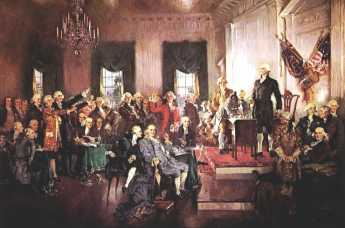 The primary purpose of any Constitution is of course survival. Usually, but not invariably, that means avoiding war with a neighbor which will surely beat you. Having stated what ought to be obvious, the framers of a Constitution need to be careful of the reasons which originally caused the new state to be formed, and also need to avoid provisions which would cause trouble by inciting some different type of governance. These features can be enumerated, but are easily forgotten.
The primary purpose of any Constitution is of course survival. Usually, but not invariably, that means avoiding war with a neighbor which will surely beat you. Having stated what ought to be obvious, the framers of a Constitution need to be careful of the reasons which originally caused the new state to be formed, and also need to avoid provisions which would cause trouble by inciting some different type of governance. These features can be enumerated, but are easily forgotten.
George Washington on the Federal Union
 On September 17, 1796, George Washington declined another term for President, taking this occasion to urge the cause of Federalism.
On September 17, 1796, George Washington declined another term for President, taking this occasion to urge the cause of Federalism.
Relocation
 Moving your place of residence has many influences, but property taxes seem to have the biggest influence on business executives decided to move. By contrast, property prices have the biggest influence on the middle class.
Moving your place of residence has many influences, but property taxes seem to have the biggest influence on business executives decided to move. By contrast, property prices have the biggest influence on the middle class.
Sanctity of Contracts
 Article I of the Constitution, states in section10 that "No state shall......pass any law.....impairing the obligation of contracts, or grant any title of nobility." While the Constitution does not precisely say the Congress may not do so, or the President might not, it is definitely omitted from the list of limited federal powers. And it is the enduring expectation of the citizenry that the federal government is no more encouraged to impair the sanctity of contracts than to grant titles of nobility.
Article I of the Constitution, states in section10 that "No state shall......pass any law.....impairing the obligation of contracts, or grant any title of nobility." While the Constitution does not precisely say the Congress may not do so, or the President might not, it is definitely omitted from the list of limited federal powers. And it is the enduring expectation of the citizenry that the federal government is no more encouraged to impair the sanctity of contracts than to grant titles of nobility.
George Mason and Triumvirates
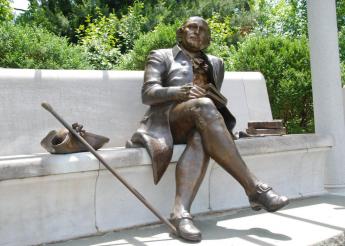
Appealing the Constitution to a Higher Authority
 The original intent of the Constitution has as much to do with what the audience thought they heard, as what the Founders meant they were saying. Or possibly, what Gouverneur Morris thought they were saying.
The original intent of the Constitution has as much to do with what the audience thought they heard, as what the Founders meant they were saying. Or possibly, what Gouverneur Morris thought they were saying.
Jury Nullification
 William Penn demonstrated one of the most incisive legal minds in England by trapping the British courts in what remains a central unresolved dilemma for the law. He was the defendant in his own case. By the South's way of looking at things, it was a pacifist effort to restrain mindless abolitionism. Meanwhile, both sides calculated it would win if the South decided to fight.
William Penn demonstrated one of the most incisive legal minds in England by trapping the British courts in what remains a central unresolved dilemma for the law. He was the defendant in his own case. By the South's way of looking at things, it was a pacifist effort to restrain mindless abolitionism. Meanwhile, both sides calculated it would win if the South decided to fight.
From Bloomberg:
In Praise of Sheldon Adelson
Sheldon Adelson appears to be this year's handiest example of campaign finance run amok. By my count, the billionaire CEO of the Las Vegas Sands and his family have donated at least $40 million to Republican political groups while promising tens of millions more. Most of the money is going to much-reviled super-PACs such as Restore Our Future, the independent expenditure committee run by former Mitt Romney aides whose sole purpose is to elect their man president while pretending they barely know him.
Adelson has a list of political axes to grind, ranging from tax rates (he wants them lower) to U.S. policy toward Israel (he opposes a two-state solution with Palestine). He is not shy about his feelings: He wants a Republican in the White House, and he's spending tens of millions to get one.
Some of Adelson's Obama-hating billionaire colleagues and corporate allies, by contrast, are too demure to operate in the open. Instead, these fragile blossoms contribute anonymously to groups like Karl Rove's Crossroads GPS (which may be a recipient of Adelson largesse, as well) or to the U.S. Chamber of Commerce, which acts increasingly like a coordinated arm of the Republican Party
So give Adelson his due: He is open about his motives and has let the public in on the deal. That's better for democracy than flooding the system with secret donations. The only people who know what those donors want in return are the candidates and their aides.
Francis Wilkinson is a member of the Bloomberg View